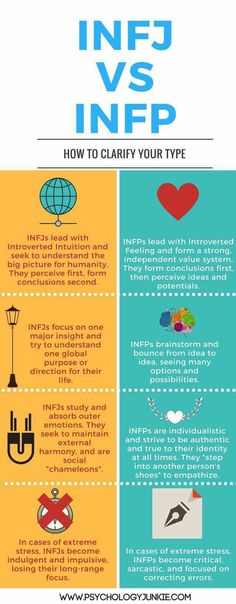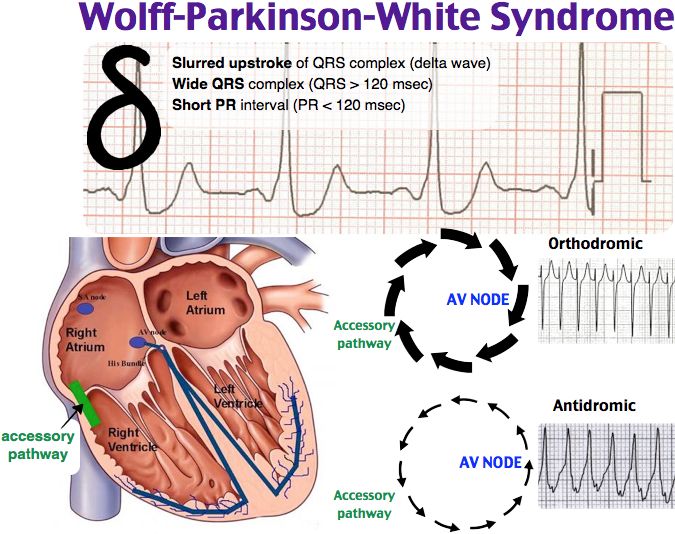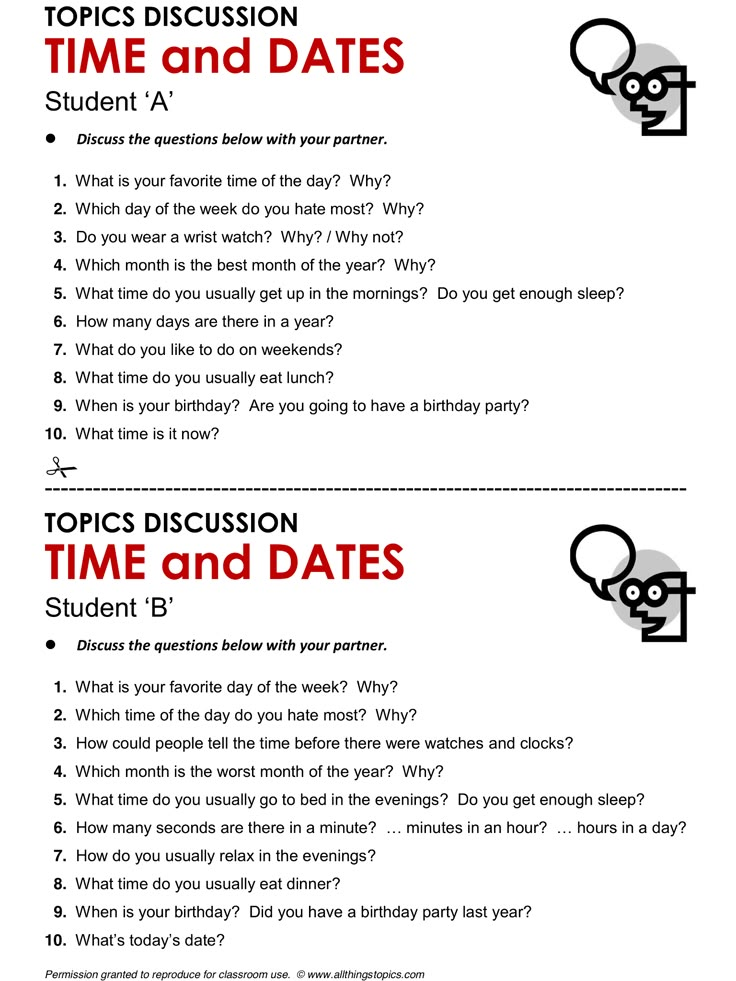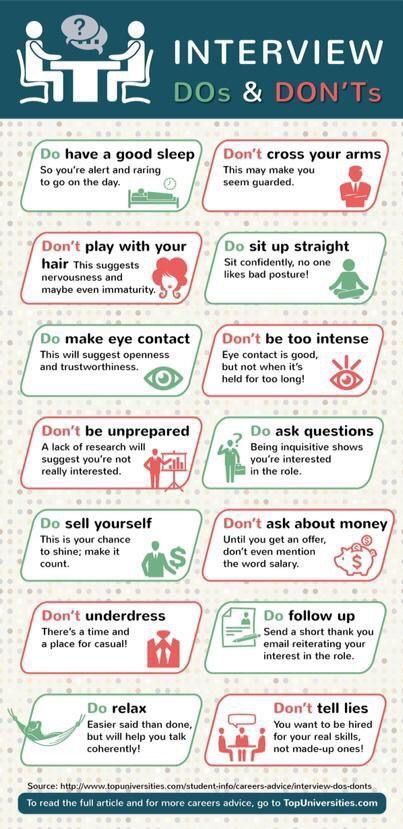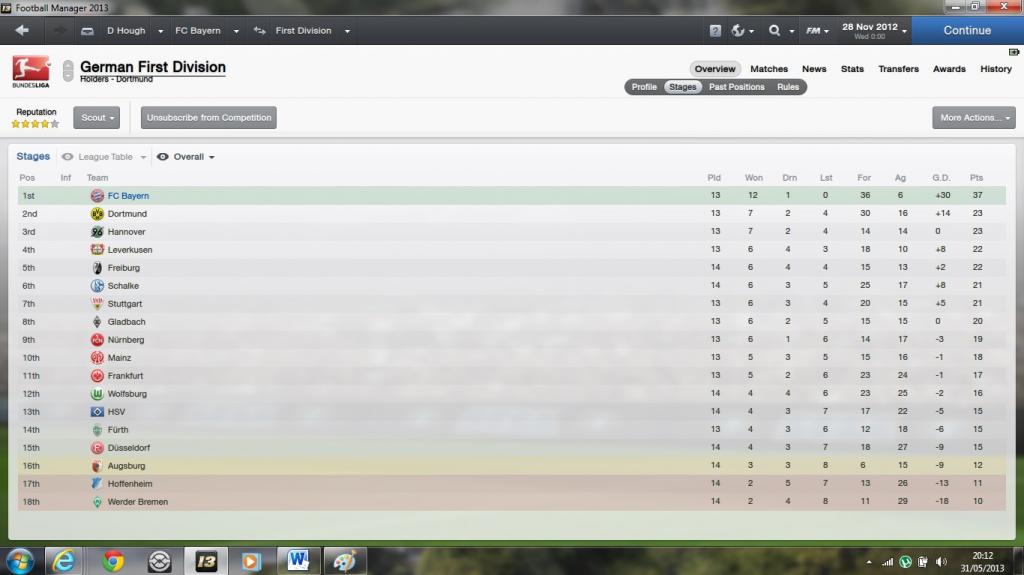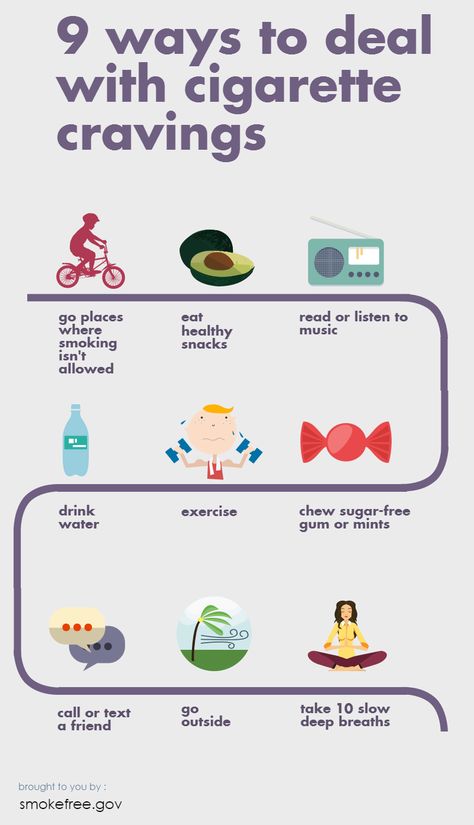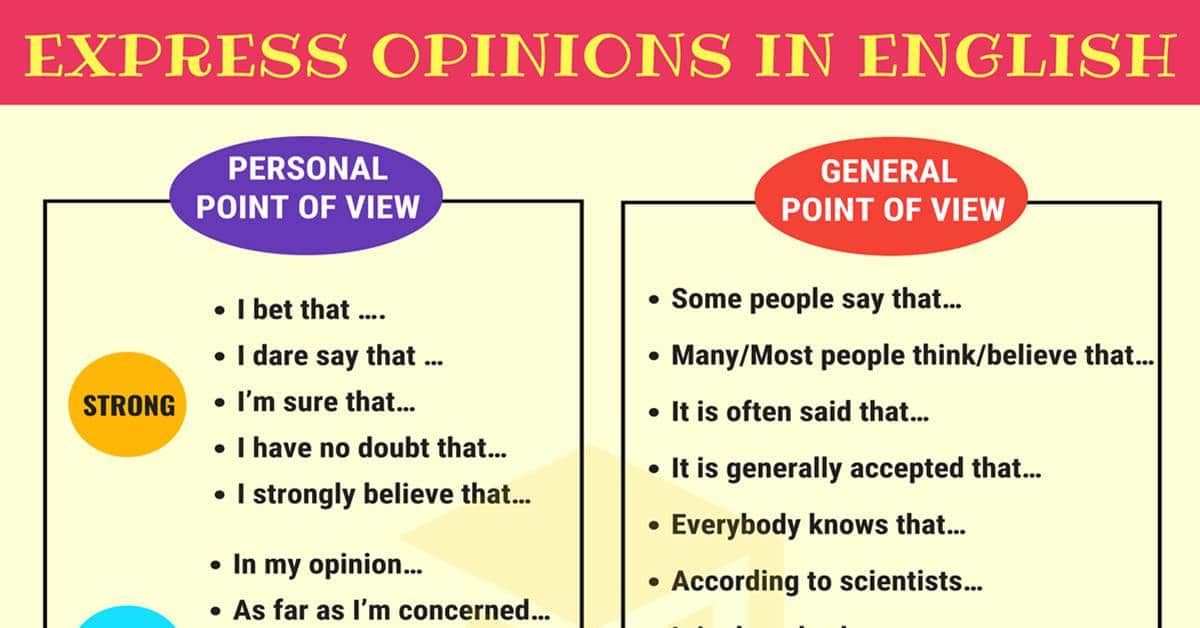Simple personality types
Understanding the 4 Personality Types: A, B, C, and D
Each person is a unique combination of four personality types. Over the centuries, these basic categories have gone by several names and designations, but for our purposes, they're known as the director, the socializer, the thinker, and the supporter. As shorthand, though, we refer to those types of personality as A, B, C, and D, respectively.
Learning how to identify people by personality type can bring a higher level of understanding to interpersonal relationships and team building, especially for employers looking for ways to avoid bad hires and reduce turnover. Indeed, a good personality test may be the most valuable tool in a hiring manager's toolbox.
Table of Contents:
- Type A personality
- Type A vs. Type B personality
- Type B personality
- Type C personality
- Type D personality
- Type X personality
- Other personality types and theories
Try our personality test free
What is a Type A personality?
A Type A personality likes to be in control of their environment and their lives. They're normally not very detail-oriented, choosing to delegate details to others. They're usually very goal-oriented and practical in their solutions. They arrive at solutions and goals with a no-nonsense, bottom-line approach.
Type A personality characteristics
While some Type A personality traits vary from person to person, certain traits are common. The best example of a Type A personality is someone who is:
- Take-charge and highly competitive
- Fast-paced and impatient
- Entrepreneurial, workaholic
- Embraces change
- Ambitious
- Works well independently
- Passionate but short-fused
- Demands maximum freedom
- Dominant and stubborn
- Multitasking
What are other names for the Type A personality?
Here are some other names for and best examples of Type A personalities.
| Personality Tests & Approaches | Type A Personality Name |
|---|---|
| The Hire Success® System | Director |
| Hippocrates | Choleric (bodily humor: yellow bile) |
| Plato | Guardian |
| Jung | Sensor |
| DISC | D; Direct/Controlling |
| Insight | Blue |
| Myers-Briggs | ESTJ, ENTJ, ENFP |
| Enneagram | Adventurer/Achiever |
| PSI | Controller |
| Biblical character | Paul |
| Cartoon/comic characters | Lucy (from Peanuts) / Rabbit (from Winnie the Pooh) |
How to test Type A personality
A Hire Success® Type A personality test assesses behavioral characteristics.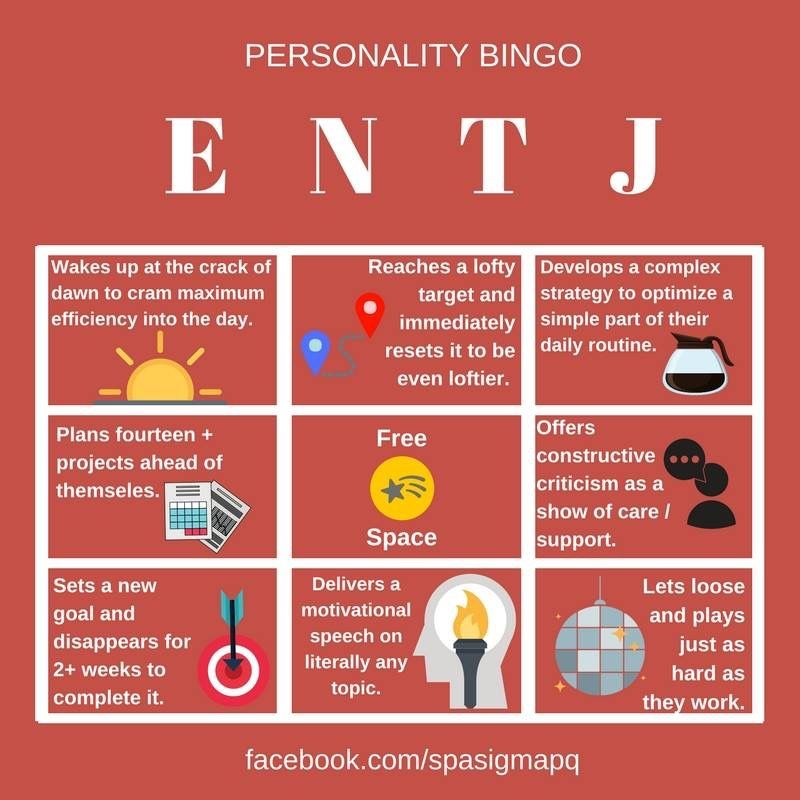 You'll get an idea of how well positive aspects like drive, perfectionism and ability to work independently balance negatives like impatience, hostility and low empathy. The test is quick, easy and even fun for employees-and gives you valuable hiring and managing insights.
You'll get an idea of how well positive aspects like drive, perfectionism and ability to work independently balance negatives like impatience, hostility and low empathy. The test is quick, easy and even fun for employees-and gives you valuable hiring and managing insights.
Try Free Book demo
Type A personality at work
When it comes to work personality types, employees with Type A personalities can typically be identified by the following traits:
- Goal-oriented
- Risk-taking
- Good under stress
- Works well independently
- Direct management style
- Good delegation skills
- Good administrative skills
- Workaholic
Type A personalities don't like a lot of restraints or restrictions placed on them. Instead, they prefer to work independently and set their own schedules. Since they tend to be workaholics, it's not unusual to see them put in whatever time and effort it takes to accomplish their goals.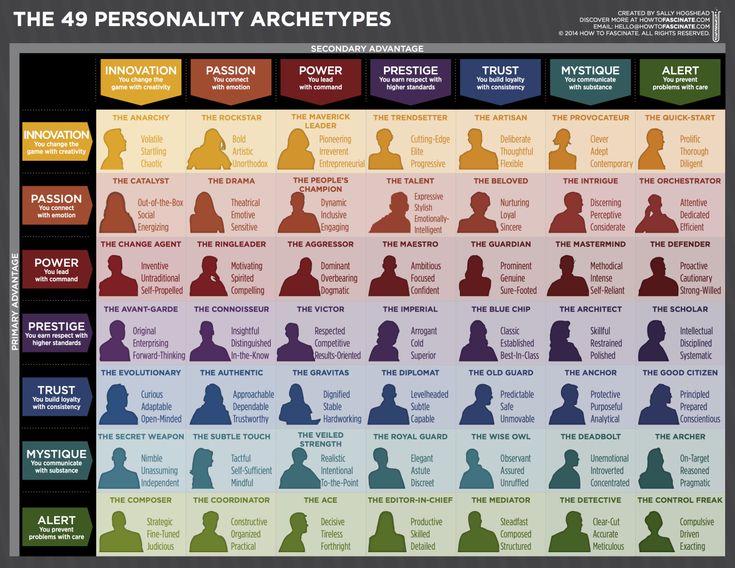 They may seem impatient at times, especially if they believe someone is spending too much time going over details with them or impeding their stride.
They may seem impatient at times, especially if they believe someone is spending too much time going over details with them or impeding their stride.
Don't be surprised to see this personality type in a supervisory position or management. Having an entrepreneurial streak, they may be a business owner or strive to own their own business someday. Type A personalities are confident and not easily discouraged.
Pros and cons of hiring Type A personality
If a Type A personality sees their day-to-day job as routine or repetitive, they'll get bored easily and won't enjoy the work. They'll want others to view them as tough in these situations, but internally they may be miserable if the job is too routine. Dominant in nature, Type A personalities will do whatever is necessary to prevent themselves from falling into patterns or routines and seek freedom instead. They'll also be very dissatisfied if they believe someone is trying to manipulate them.
A Type A personality may not be very good at recognizing coworker's feelings and needs.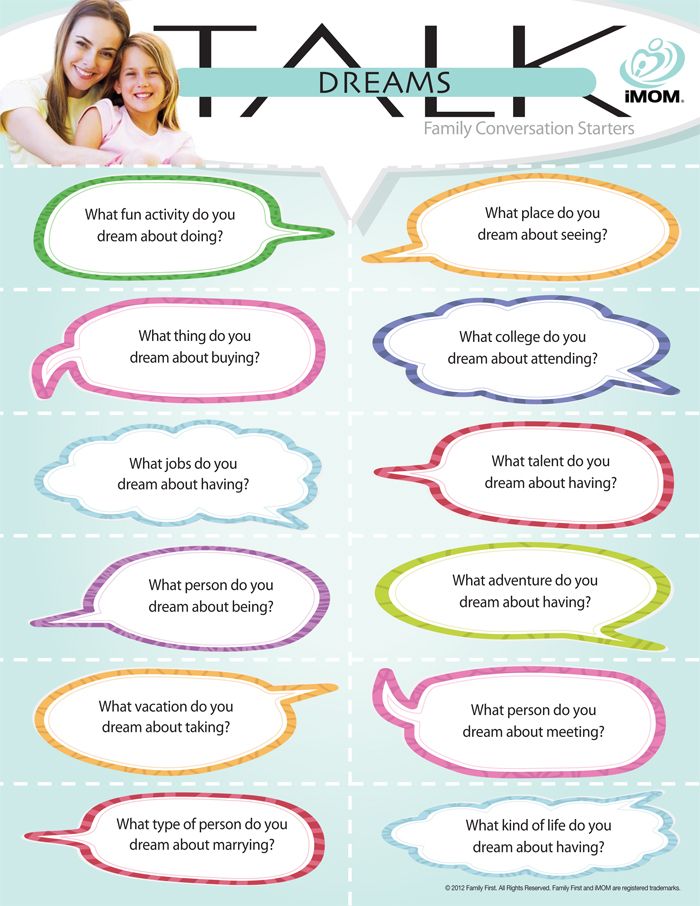 They're extremely focused on achieving their goals and may not notice. If you're looking for someone who works well under pressure and seems to excel in high-stress situations, the Type A personality is the best pick.
They're extremely focused on achieving their goals and may not notice. If you're looking for someone who works well under pressure and seems to excel in high-stress situations, the Type A personality is the best pick.
How to deal with Type A personality at work
Managing employees with type A personality traits at work is a balance. They can be valuable in terms of problem solving and productivity, but when unmanaged, can be disruptive. Managing motivations and situations is the key.
What motivates a Type A personality?
- Money
- Opportunity
- Freedom
- Favorable risk-reward ratio
- Challenges
- Urgency
- Success
- Leadership
What are some common words or phrases that motivate or grab the attention of the Type A personality?
- "Let's get it done."
- Fast
- Results
- Immediate/today/now
- The bottom line
- "What do you think about ___?"
- "The best (newest, cutting-edge, etc.
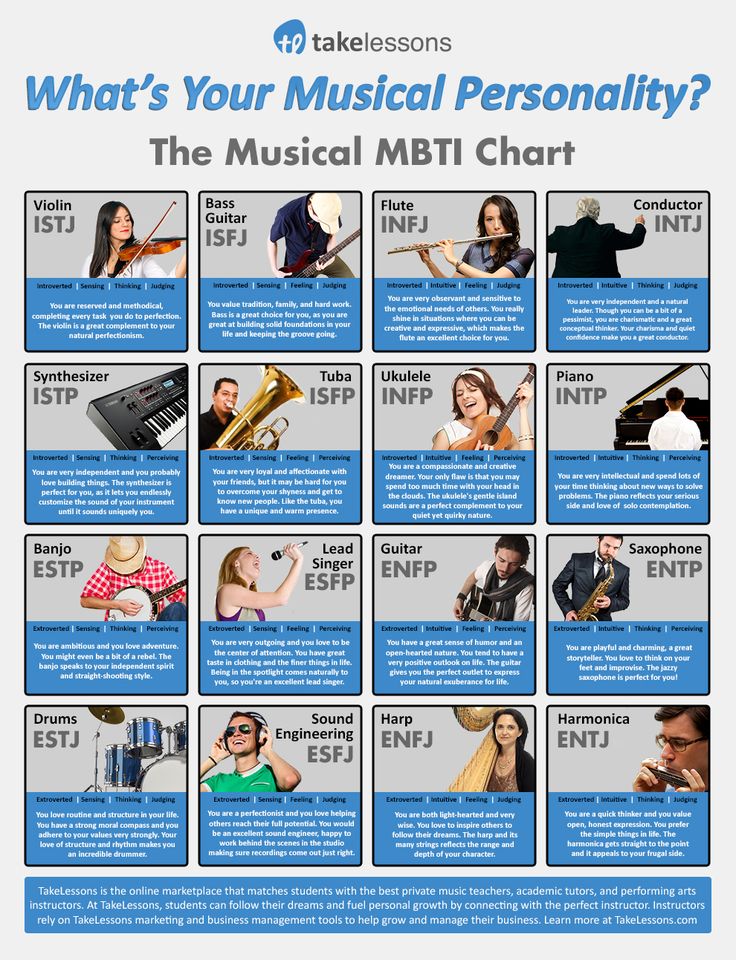 )"
)" - Take the challenge
- Great return on investment
What are the turnoffs, dislikes, and fears of the Type A personality?
- Touchy-feely things
- Long explanations or descriptions
- Explaining things in emotional terms or more than once to the same person
- Looking vulnerable
- Falling into routines
- Being manipulated
- Losing
Which jobs attract a Type A personality?
The best careers for Type A personality include:
- President/CEO
- General contractor
- Salesperson or sales manager
- Business owner
- Politician
- Entrepreneur
- Police/military officer
- Manager
- Executive
Back to Top
Type A vs. Type B personality
Having a mix of personalities on your team and ensuring that they mesh will help your department or company truly excel. Understanding a Type A vs. Type B personality will help you get the balance right between these two working styles.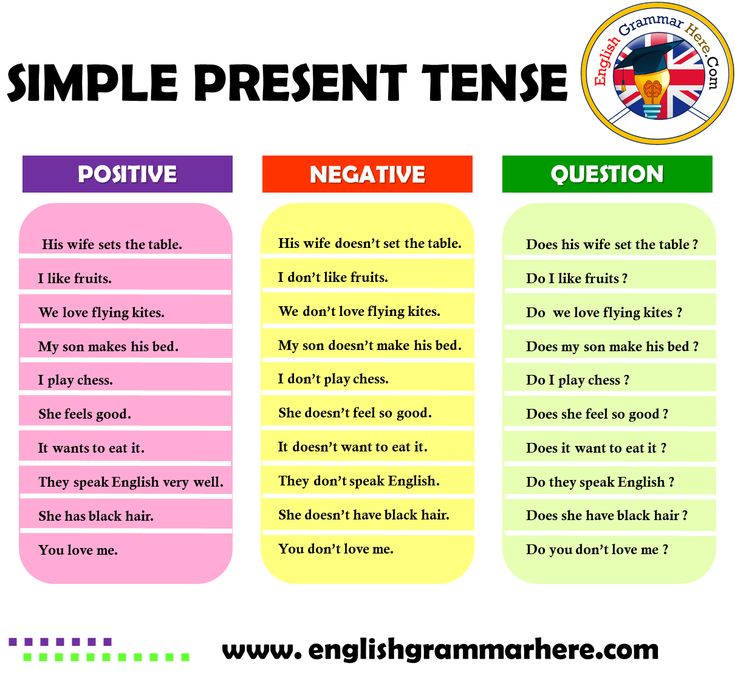
Pair goal-oriented, future-thinking Type A people with agreeable and present-focused Type Bs.
Controlling Type As can be complimented by Type Bs who work on forging strong relationships.
Self-motivated Type As can keep Type Bs, who are driven by others on the team, focused in the right direction.
It helps to understand both personality types when balancing out teams. Here is a deep dive into what a Type B personality is.
What is a Type B personality?
The Type B personality is a very outgoing, energetic and fast-paced individual who likes to be around people and enjoys being the center of attention. They're good relationship-builders and most people like them right away. Their driving need is for approval, so they try to like everyone in hopes everyone will like them, too. Compliments, acknowledgement of their achievements, words of admiration, and even applause from these groups are the most important thing you can do for them.
Type B personality traits
Like Type A personalities, Type B personality characteristics can also vary by individual.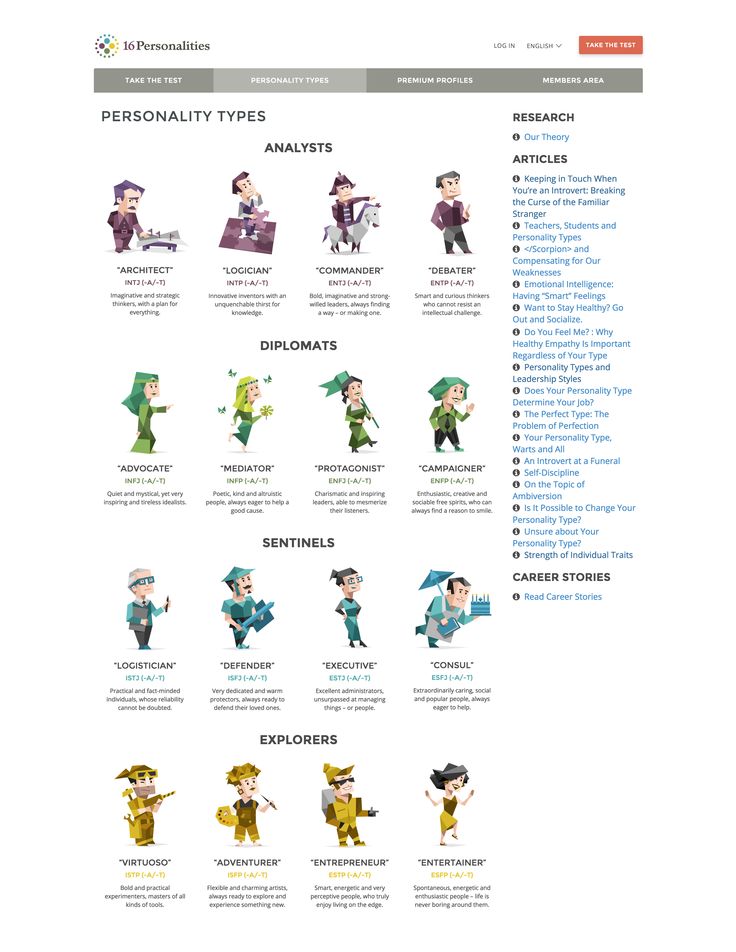 The best example of Type B personality is someone who is:
The best example of Type B personality is someone who is:
- Enthusiastic and fun-loving
- Persuasive
- Friendly
- Charismatic and confident
- Idea person, dreamer
- Short attention span
- Motivator
- Spontaneous and impulsive
- Procrastinator
What are other names for the Type B personality?
| Personality Tests & Approaches | Type B Personality Name |
|---|---|
| The Hire Success® System | Socializer |
| Hippocrates | Sanguine (bodily humor: blood) |
| Plato | Artisan |
| Jung | Intuitor |
| DISC | I; direct/supporting |
| Insight | Green |
| Myers-Briggs | ENTJ, ENTP, INTJ, INTP |
| Enneagram | Helper/romantic |
| PSI | Promoter |
| Biblical character | Peter |
| Cartoon/comic characters | Snoopy (from Peanuts) / Tigger (from Winnie the Pooh) |
How to test Type B personality
The Hire Success® Type B personality test helps you assess how a given person will fit within your culture and teams.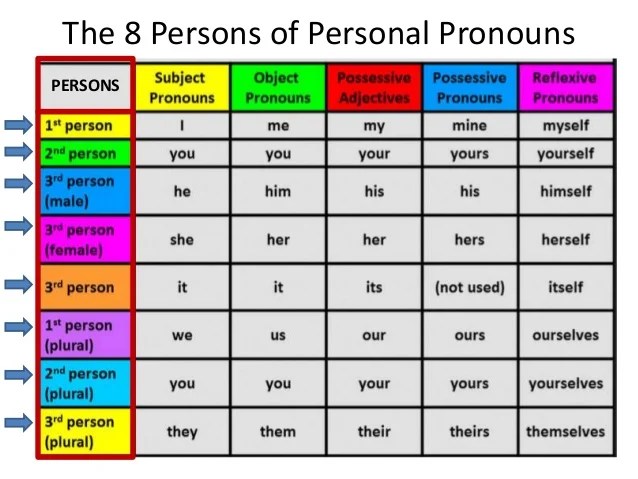 While you may make you feel comfortable surrounding yourself with people like you, it's better to have a good balance of personalities on your team.
While you may make you feel comfortable surrounding yourself with people like you, it's better to have a good balance of personalities on your team.
This test lets you find Type B personality traits like being easy-going, optimistic, creative and a team player with weaknesses like being impulsive, needy of validation, and procrastinating. The test is easy and gives you valuable insights for hiring and managing potential team members.
Try Free Book demo
Type B personality at work
Employees with Type B personalities can typically be identified by the following traits:
- Relationship-oriented
- Outgoing
- Enthusiastic
- Doesn't finish what was started
- May try to do too much at once
- Easily bored
- Easily liked by most people
Type B personalities love to talk about themselves. Some may view that as self-centered, but a Type B's real motivation is to be liked. For an extreme example, Bette Midler in the movie Beaches invited an old friend up to see her lavish apartment and told her about her great success.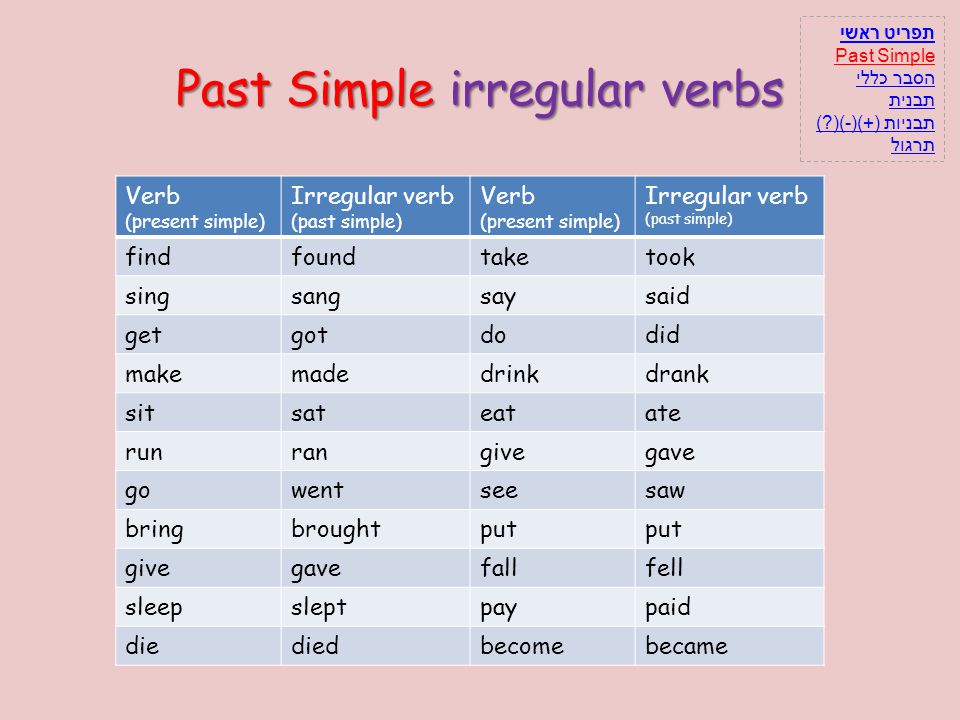 She said to the friend: "Enough about me. Let's talk about you. So, what do you think of me?"
She said to the friend: "Enough about me. Let's talk about you. So, what do you think of me?"
The Type B personality's biggest fear is being humiliated in public, since that might make many people disapprove of them. It could be traumatic for them. The B personality doesn't want to appear unattractive or unsuccessful either, so they'll hide any weakness.
Pros and cons of hiring Type B personality
Some of the strengths you can count on from the Type B personality are their enthusiasm, outgoing behavior, friendliness, and their ability to persuade even the most skeptical of people. They tend to be dreamers and can often turn those dreams into very practical ideas in the workplace. Type B personalities are spontaneous and use their quick wit and humor to make people like them. They aren't very good about hiding their own feelings either, so if they're hurt or disappointed, you'll probably be able to read it in their mannerisms and overall disposition.
Some of the natural weaknesses associated with the Type B personality include being impatience, a short attention span, and not being very detail-oriented.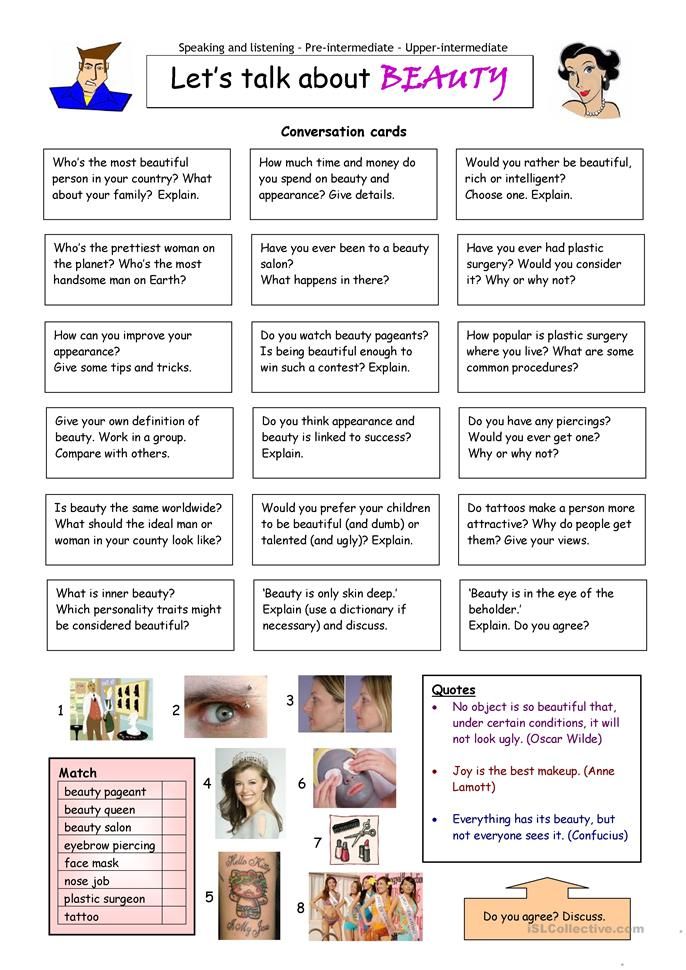 In business, Type B personalities may tend to over-socialize and not spend as much time doing their work because they strive for social interaction. During the hiring process, they may be inclined toward unstructured, rambling interviews rather than structured ones, and bad interviews can lead to bad hires. Despite their natural tendency, many Type B personalities have learned to keep their counterproductive impulses in check while benefiting from the positives.
In business, Type B personalities may tend to over-socialize and not spend as much time doing their work because they strive for social interaction. During the hiring process, they may be inclined toward unstructured, rambling interviews rather than structured ones, and bad interviews can lead to bad hires. Despite their natural tendency, many Type B personalities have learned to keep their counterproductive impulses in check while benefiting from the positives.
How to deal with Type B personality at work
Put Type B people on teams and spend time working with them directly. Avoid putting them in a solitary position with little interaction because they're most effective in collaborative situations. They're also ideal for positions where they must interact with customers or suppliers and thrive in social settings.
What motivates a Type B personality?
- Public recognition
- Awards, plaques, certificates
- Having picture taken with celebrities
- Succeeding, especially beyond peers
- Being the center of attention, public speaker, director, etc.
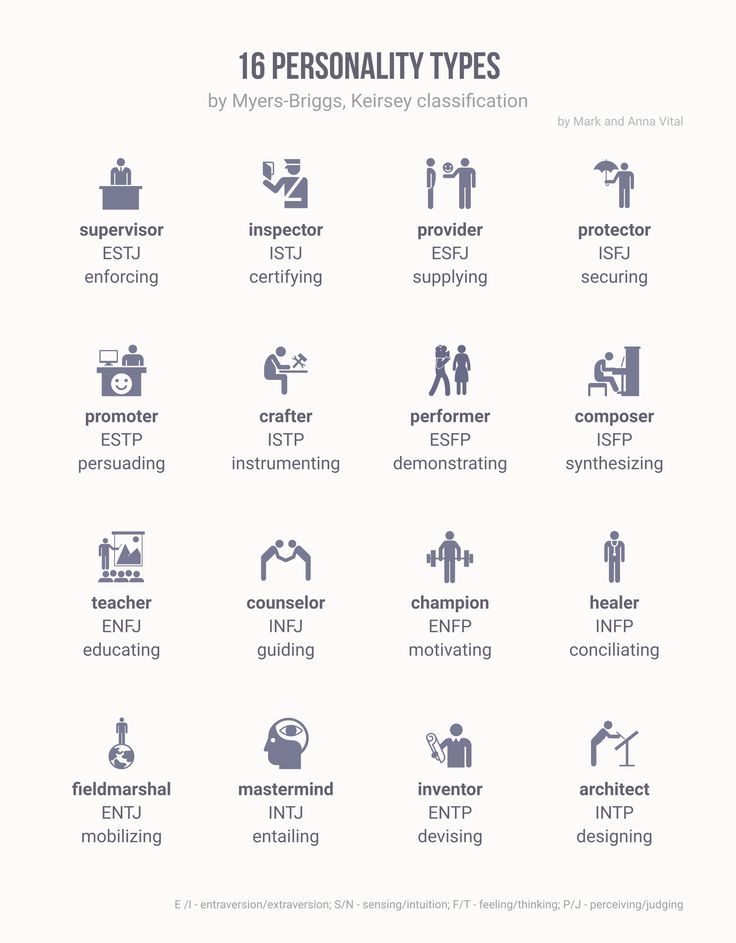
- Acceptance
- The latest styles and/or trends
What are some common words or phrases that motivate or grab the attention of the Type B personality?
- "You look great."
- "You're the best ____."
- "People love you."
- "This will be fun."
- Entertaining
What are the turnoffs, dislikes, and fears of the Type B personality?
- Public humiliation
- Being unappreciated
- Appearing uninvolved
- Nonsocial types
- Appearing unattractive
- People and things that distract attention
- Appearing unsuccessful
- Appearing unacceptable
The best careers for Type B personality include:
- Public relations
- Salesperson
- Entertainment
- Personnel interviewer
- Professional host(ess)
- Politician
- Recreation director
- Party planner
- Customer service/relations
Back to Top
What is a Type C personality?
The Type C personality is a very detail-oriented individual who likes to be involved in things that are controlled and stable.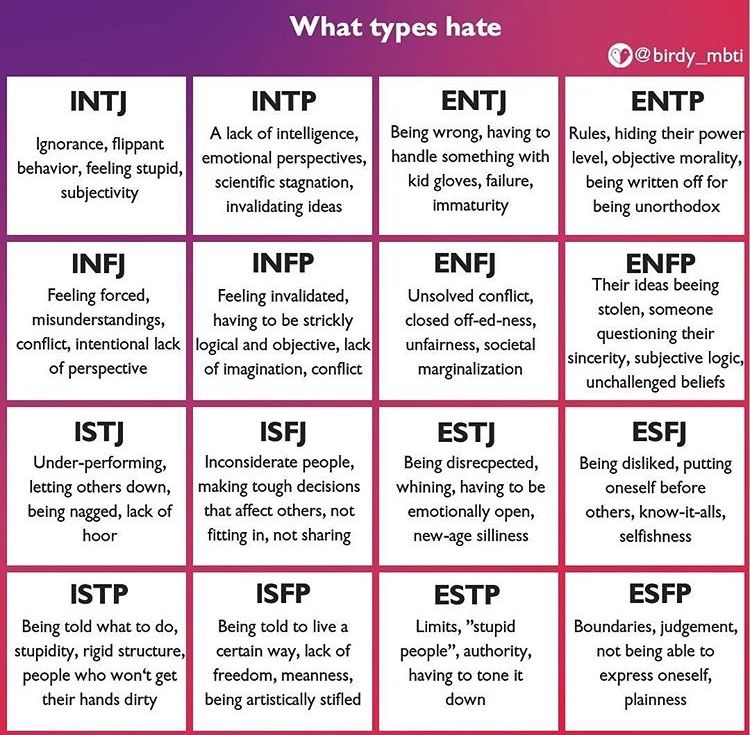 They're interested in accuracy, rationality, and logic. People who can't seem to control their emotions will bother them because Type C personalities believe being emotional makes objectivity difficult. They also dislike being around people who are full of hype, since they desire facts, accuracy and logic. Other people's emotions may not be a priority for them, as they tend to strive for the facts and let the chips fall where they may.
They're interested in accuracy, rationality, and logic. People who can't seem to control their emotions will bother them because Type C personalities believe being emotional makes objectivity difficult. They also dislike being around people who are full of hype, since they desire facts, accuracy and logic. Other people's emotions may not be a priority for them, as they tend to strive for the facts and let the chips fall where they may.
Type C personality characteristics
Type C personalities come with considerable variations, however, the best example of a Type C personality is someone who is:
- Accuracy and detail-oriented
- Creative
- Dependable
- Skeptical
- Independent and can appear anti-social
- Lawful
- Organized
- Analytical and critical
- Worried about progress
- Detached and disengaged
What are other names for the Type C personality?
| Personality Tests & Approaches | Type C Personality Name |
|---|---|
| The Hire Success® System | Thinker |
| Hippocrates | Melancholic (bodily humor: black bile) |
| Plato | Scientist |
| Jung | Thinker |
| DISC | C; indirect/controlling |
| Insight | Gold |
| Myers-Briggs | ESTJ, ESFJ, ISTJ, ISFJ |
| Enneagram | Asserter/perfectionist |
| PSI | Analyst |
| Biblical character | Moses |
| Cartoon/comic characters | Linus (from Peanuts) / Eeyore (from Winnie the Pooh) |
How to test Type C personality
The Hire Success® Type C personality test helps you find people with traits in this cluster.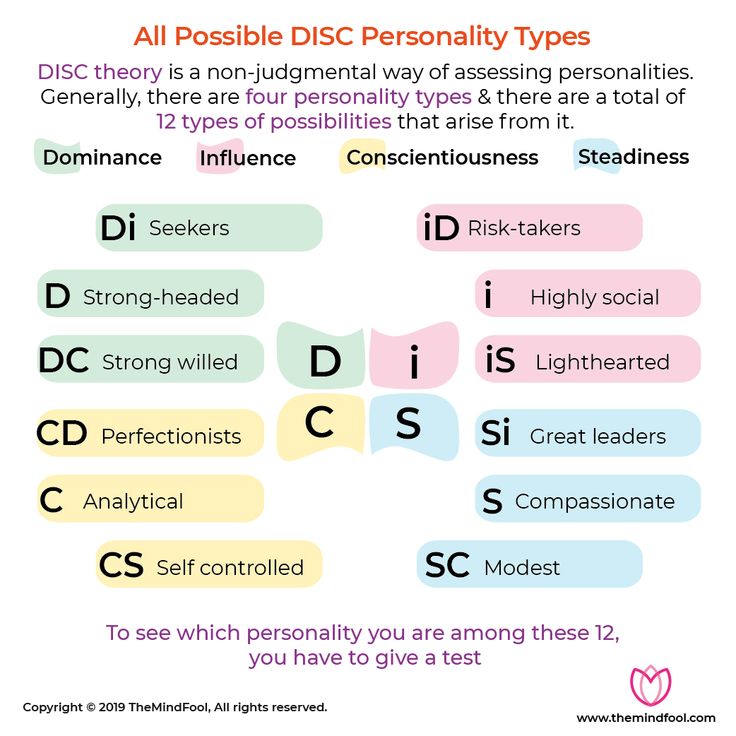 You will be able to quickly assess the positives, like detail-oriented focus, ability to work alone, troubleshooting and planning skills. You will be able to manage the negatives like social inhibition, conflict avoidance and anxiety.
You will be able to quickly assess the positives, like detail-oriented focus, ability to work alone, troubleshooting and planning skills. You will be able to manage the negatives like social inhibition, conflict avoidance and anxiety.
Try Free Book demo
Type C personality at work
People with Type C personalities can typically be identified by the following traits:
- Detail-oriented
- Logical
- Prepared
- Likes to do things their own way
- Worry about progress
- May never have personal expectations met
- Quality control
Type C personalities tend to be quite controlling, both of themselves and others. They don't like things to get out of hand and may appear stoic because they don't really want themselves to display a lot of emotion. They're very outcome-driven and will be sticklers for following protocol.
They're careful, resourceful, and, above all, excellent thinkers who will look at all aspects of an issue before taking a stand.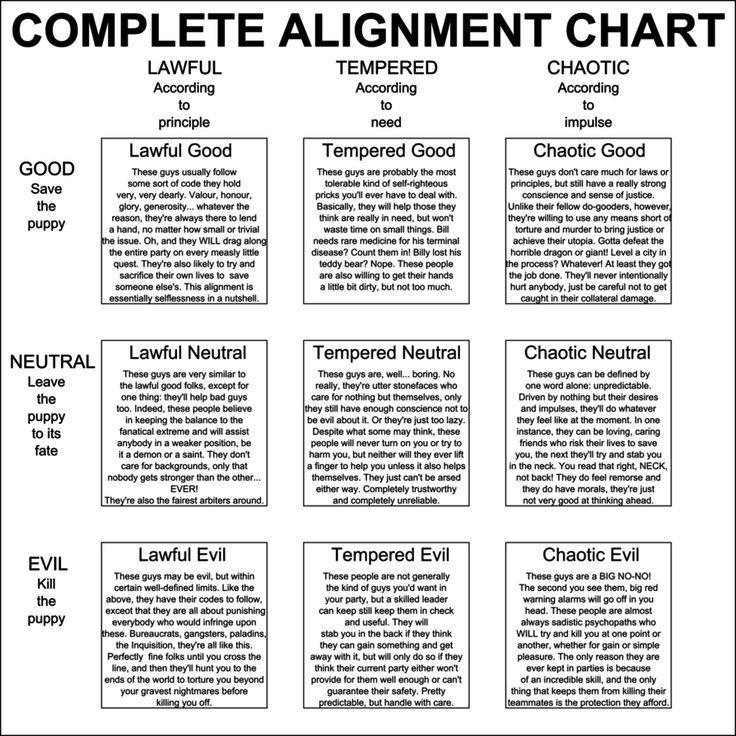 Once they take a stand on an issue, though, they'll have the facts to back it up, so anyone who challenges them better be prepared. If you have a Type C personality on your job candidate shortlist, you'll want to prepare some thoughtful interview questions if you don't want a carefully rehearsed response.
Once they take a stand on an issue, though, they'll have the facts to back it up, so anyone who challenges them better be prepared. If you have a Type C personality on your job candidate shortlist, you'll want to prepare some thoughtful interview questions if you don't want a carefully rehearsed response.
Pros and cons of hiring Type C personality
Type C personalities like their jobs to be clearly defined and want to know their expectations. Knowing those facts, they will be able to prioritize their tasks and see them through to completion.
In managerial roles, they're cautious and logical and require many details and facts before they make a decision. People who try to sell them something with emotion usually fail. The Type C personality would consider such an effort to be hype and would wonder what facts the other person is trying to hide.
In more public roles, Type C personalities will strive for originality, cleverness and uniqueness in all things. Because of their detailed orientation, they're meticulously prepared to defend their decisions against any possible objections.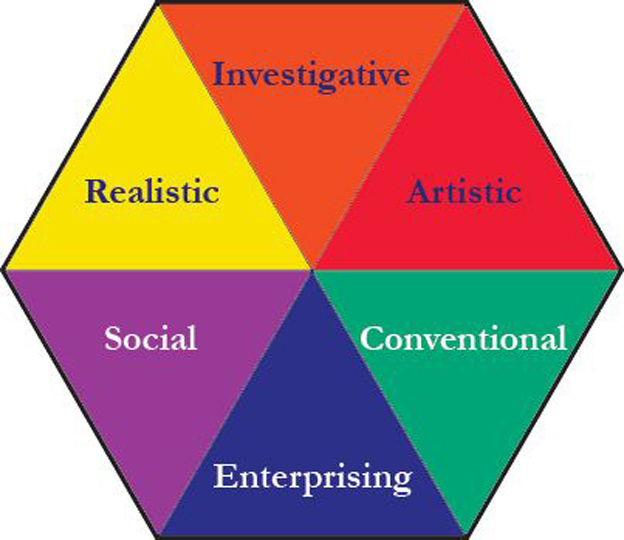 Many accountants and lawyers are Type C personalities. They're excellent for any job that requires creative thinking based on patience, facts and accuracy.
Many accountants and lawyers are Type C personalities. They're excellent for any job that requires creative thinking based on patience, facts and accuracy.
How to deal with Type C personality at work
Those with Type C personality traits can play valuable roles on your team. They're motivated to handle important tasks that require determination and an eye for detail. They're less comfortable in leadership positions and prefer to work alone.
What motivates a Type C personality?
- Control
- Opportunities to be independent and analytical
- Challenges
- Problem-solving
What are some common words or phrases that motivate or grab the attention of the Type C personality?
- Perfection
- "How does that work?"
- Quiet, solitude
- "Tell me more about ____."
What are the turnoffs, dislikes, and fears of the Type C personality?
- Uncontrolled emotions
- Irrational acts
- Indecision
- People who are self-centered, or self-aggrandizement
- Loss of control
- Being subject to control or supervision by people they don't trust or respect
- Distractions or distracting people
Which jobs attract a Type C personality?
The best careers for Type C personality include:
- Forecaster
- Troubleshooter
- Critic
- Investigator (police, crime scene, private, etc.
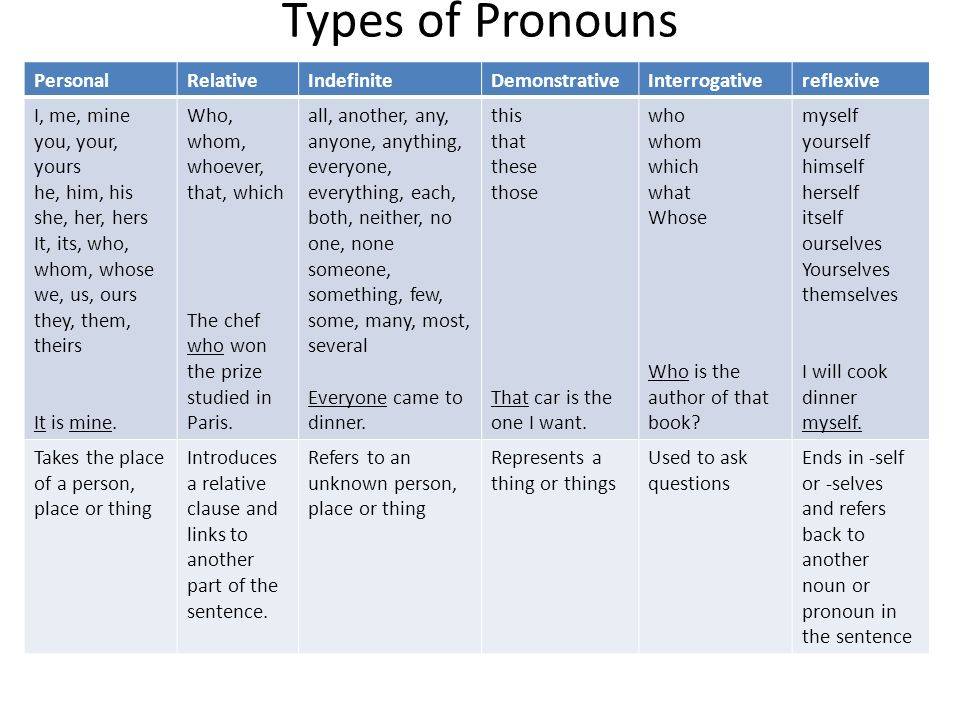 )
) - Engineer
- Technical support
- Research scientist
- Game designer
- Data analyst
- Pilot
- Programmer/analyst
- Artist
- Actuary
- Musician
- Accountant/auditor
- Inventor
Back to Top
What is a Type D personality?
A Type D personality takes a slower, easier pace toward their work and life in general. They seek security and longevity on the job and are very happy doing a repetitive task day in and day out. The repetition allows them to become very skilled. Likewise, they won't like it if the rules change a lot. That's contrary to their desire to minimize change and stick with what they know works. For the Type D personality, even though the current way may be unpleasant, they worry that the unknown may be even worse.
Type D personality traits
As with the previous personalities, you'll find plenty of variation with Type D people. The best example of a Type D personality is someone who is:
- Shy, low-key and observant
- Caring
- Sincere
- Consistent, dependable
- Calm and stable
- Fair and equitable
- Looks approachable
- Avoiding confrontation
- Resistant to change
- Self-confident
What are other names for the Type D personality?
| Personality Tests & Approaches | Type D Personality Name |
|---|---|
| The Hire Success® System | Supporter |
| Hippocrates | Phlegmatic (bodily humor: phlegm) |
| Plato | Philosopher |
| Jung | Feeler |
| DISC | S; indirect/supporting |
| Insight | Orange |
| Myers-Briggs | ESTP, ESFP, ISTP, ISFP |
| Enneagram | Peacemaker/observer |
| PSI | Supporter |
| Biblical character | Abraham |
| Cartoon/comic characters | Charlie Brown (from Peanuts) / Winnie the Pooh |
How to test Type D personality
Because Type D personalities are anything but easy going, finding out what makes them tick can help you get the most from hiring this type.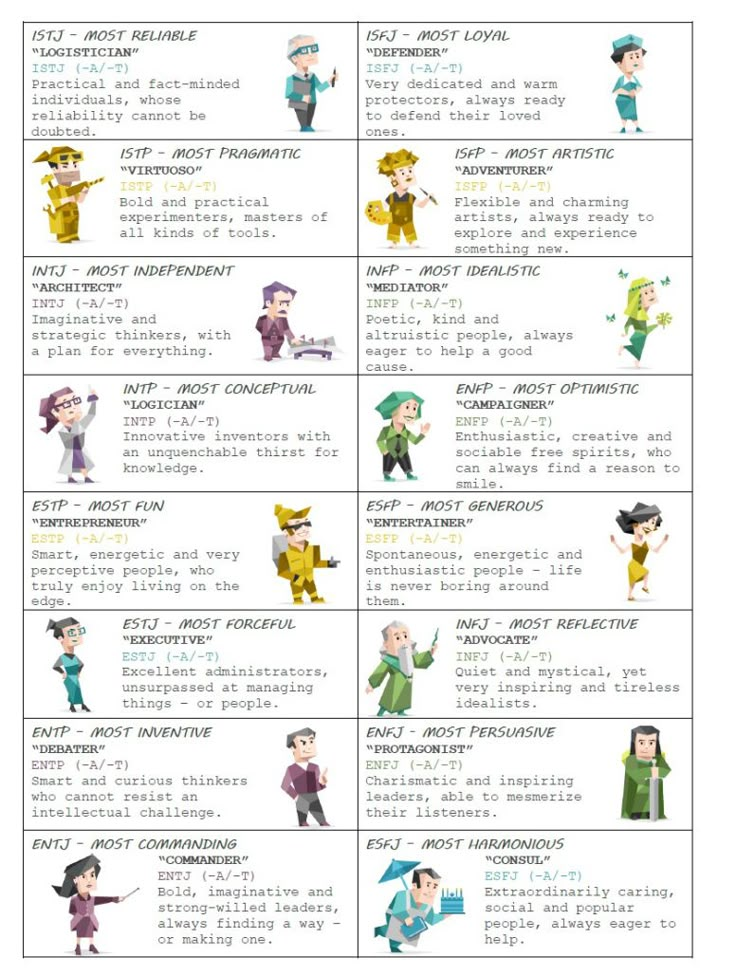 While they're highly trustworthy, compassionate, and deep thinkers, they can suffer from low self-confidence and pessimism. The Hire Success® Type D personality test will help you find the right place for them on your team.
While they're highly trustworthy, compassionate, and deep thinkers, they can suffer from low self-confidence and pessimism. The Hire Success® Type D personality test will help you find the right place for them on your team.
Try Free Book demo
Type D personality at work
People with Type D personalities can typically be identified by the following traits:
- Task-oriented
- Stabilizing
- Cautious
- Going along when they don't agree
- Easily used by others
- Uncomfortable with constant change
- Good at routines or repetitive tasks
They seek the respect, sincere admiration, and acceptance of others. The Type D personality will gladly work hard to please the people they work for as long as they feel appreciated and receive plenty of reassurance that they're needed. They need that sense of security. Type D personalities often think the Type A personality is crazy for taking so many risks and not showing much concern for security and longevity.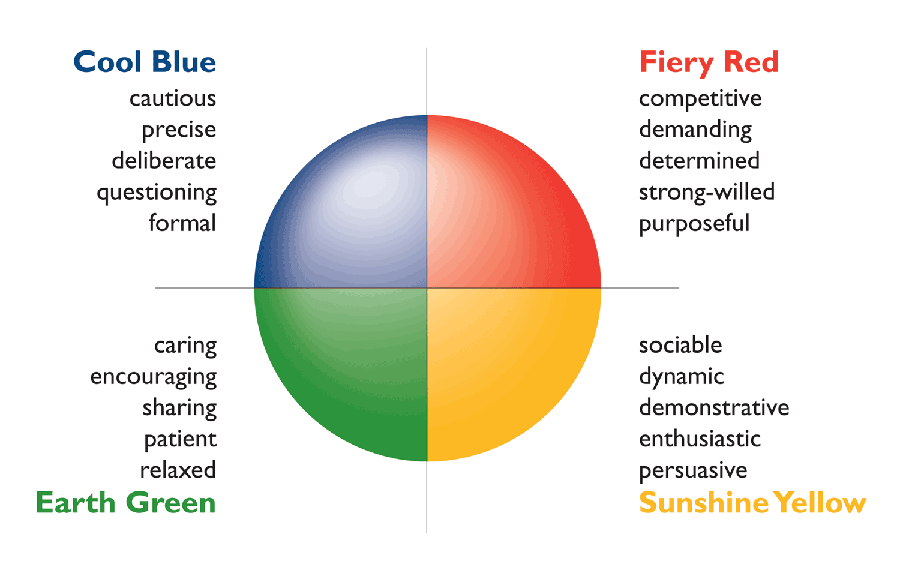
Pros and cons of hiring Type D personality
People with Type D personality traits are usually very organized; being around a messy environment or disorganization will bother them. They're also good at playing a very supportive role with others and are normally very caring, thoughtful, and compassionate. They're patient, tend to be good listeners and will persevere when all others have given up. A stabilizing force, they especially like working in a group or on a team.
Although they may not be as fast as others, they're accurate and thorough. They'll usually keep their feelings to themselves and are reluctant to express themselves, even if a more assertive type seems to be taking advantage of them. They tend to go along with anything.
To attract the Type D personality in a job ad, be sure to talk about the company benefits package and the long-term growth potential within the company. Having a secure, stable environment will be very important to Type D personalities.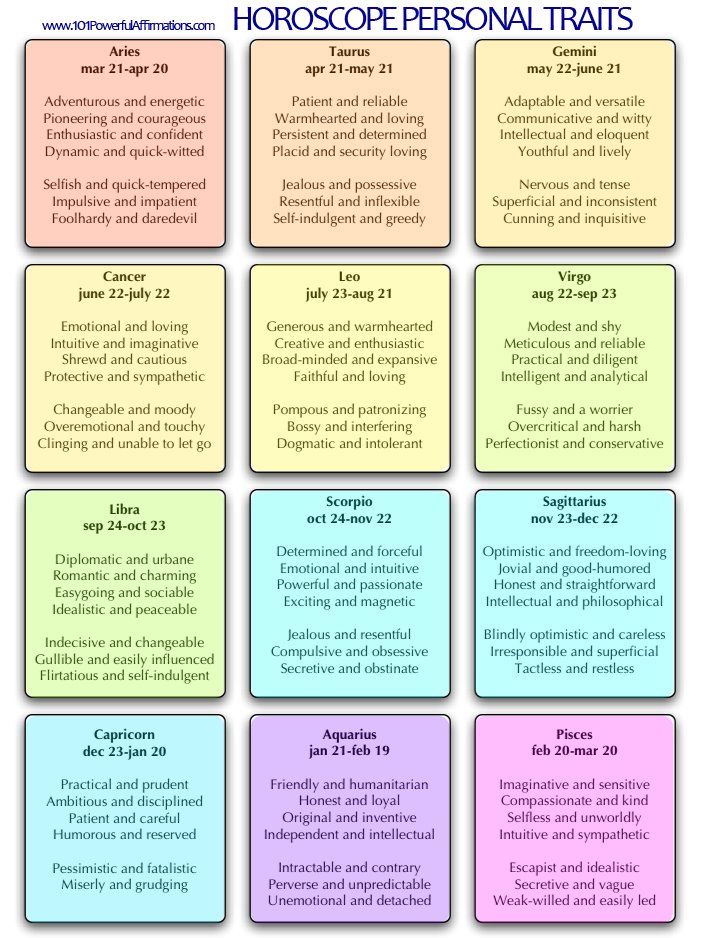
How to deal with Type D personality at work
Managing a Type D personality takes some finesse. You cannot let their natural pessimism and social comfort issues bring down the team. Their hard-working nature, compassion and honesty are valuable strengths. They're keen at observation and think things through, so they can be valuable at solving problems and reducing risk.
What motivates a Type D personality?
- Stability
- Benefits
- Security
- Low risk
- Routine
- Team/group opportunities
- Calm work atmosphere
What are some common words or phrases that motivate or grab the attention of the Type D personality?
- "Help others in need"
- Relaxed atmosphere
- Logical
- Rational
What are the turnoffs, dislikes, and fears of the Type D personality?
- Risks
- Pushy people
- Change (especially frequent change)
- Instability
- Disorganization
- Aggressive behavior
- Disruption in routine
- Surprises
- The unknown
- Conflict
Which jobs attract a Type D personality?
Considering the benefits they bring to your organization, the best careers for Type D personality include:
- Secure team position
- Administrator
- Financial services
- HR manager
- Social worker
- Bureaucrat
- Family doctor/nurse
- Assembly line worker
- Residential/community services
- Mechanic
- Teacher
- Counselor
- Personal assistant/secretary
- Minister
- Insurance agent
- Supervisor
- Librarian
- Security guard
- Customer service representative
Back to Top
What is a Type X personality?
Whenever two or more personality types are equal in strength within a person, that person is considered a Type X personality.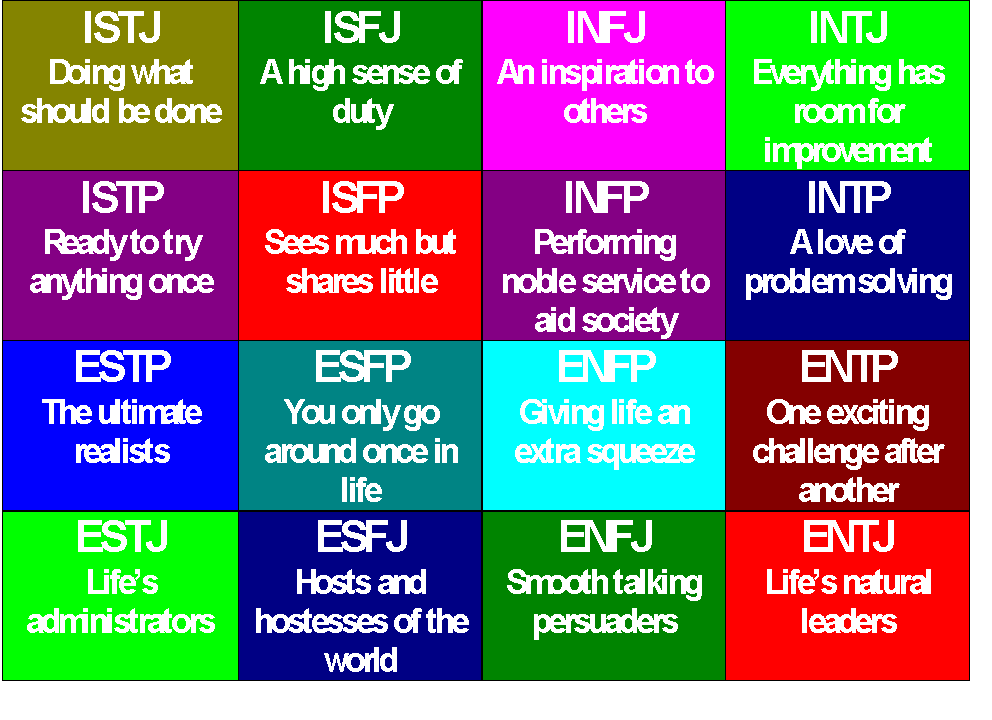 For example, if an individual's two highest-strength personality types were A and B, they might be identified as AX and BX. In the rare event that all four personality types were identical, that person would be considered simply as a Type X personality.
For example, if an individual's two highest-strength personality types were A and B, they might be identified as AX and BX. In the rare event that all four personality types were identical, that person would be considered simply as a Type X personality.
Type X personality traits
The X indicates a cross or an intersection of two or more types. It's not unusual to see the X between two of the four personality types, and it doesn't necessarily have to include the primary personality. However, when it does include the primary personality, the individual in question may have a tendency to be like one type in one situation and the other type in another. When all four temperaments are very close in strength, the individual may seem like a mixture of personalities.
This can be beneficial for many jobs, especially when it's important that the person gets along with almost everybody, such as consultative sales people. The Type X personality tends to change personality "colors" as needed based on their surroundings.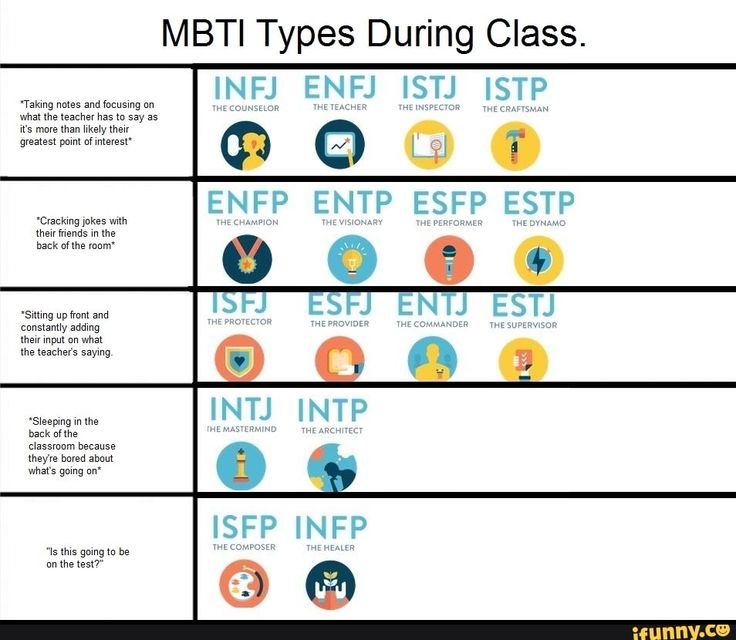 Although unpredictable at times, this rare combination could be an important asset if fully utilized.
Although unpredictable at times, this rare combination could be an important asset if fully utilized.
How many personality types are there?
Depending on the model, you can have just four or five personality types or sixteen or more. Here are the most common ways of categorizing personalities.
The Big Five personality traits
This model looks at how a person thinks, feels and behaves. What is called “openness to experience” refers to curiosity and creativity. "Conscientiousness" measures affinity for organization and responsibility. Measuring "extraversion" provides insight as to sociability and being assertive. "Agreeableness" refers to getting along with people, being compassionate and showing respect. Finally, things like anxiety and depression are measured by "neuroticism".
Myer-Briggs Type Indicator
This test measures how people perceive their worlds, make decisions, and interact with others. It's not ideal as a pre-employment test because it can be easily manipulated.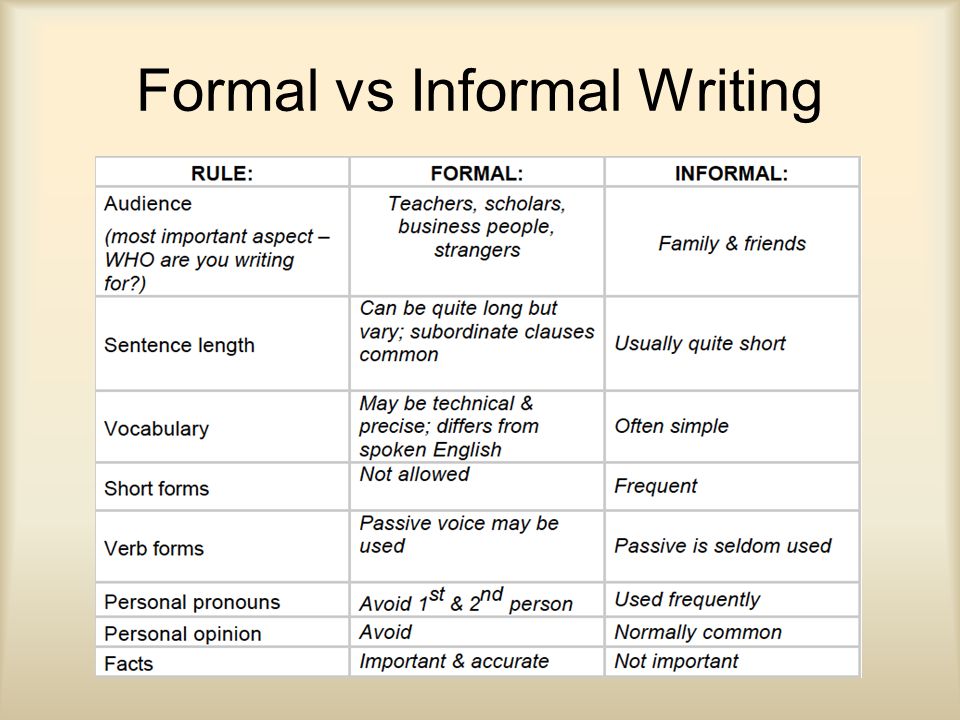 People can guess what answers might seem most desirable for a given role. It also outputs rather complex results, making it impractical for hiring and managing people.
People can guess what answers might seem most desirable for a given role. It also outputs rather complex results, making it impractical for hiring and managing people.
16 Personality Types
The Myers-Briggs® model identifies four personality trait clusters that can combine in multiple ways, leading to sixteen distinct combinations. While valid results can be fascinating, they're just not practical or reliable for managing teams. The Type A B C D personality test model that Hire Success® uses evaluates 20 different trait scales independently, providing three-dimensional insight in a simple format. It reveals the individual without forcing them into one of four boxes.
How to use the 4 basic personality types: A, B, C, and D
Expect similar descriptions printed on the Hire Success® Overview Report. Each applicant is instructed to respond to the Hire Success®Personality Profile form based on how they work. The results will indicate which of the four personality types they draw from most.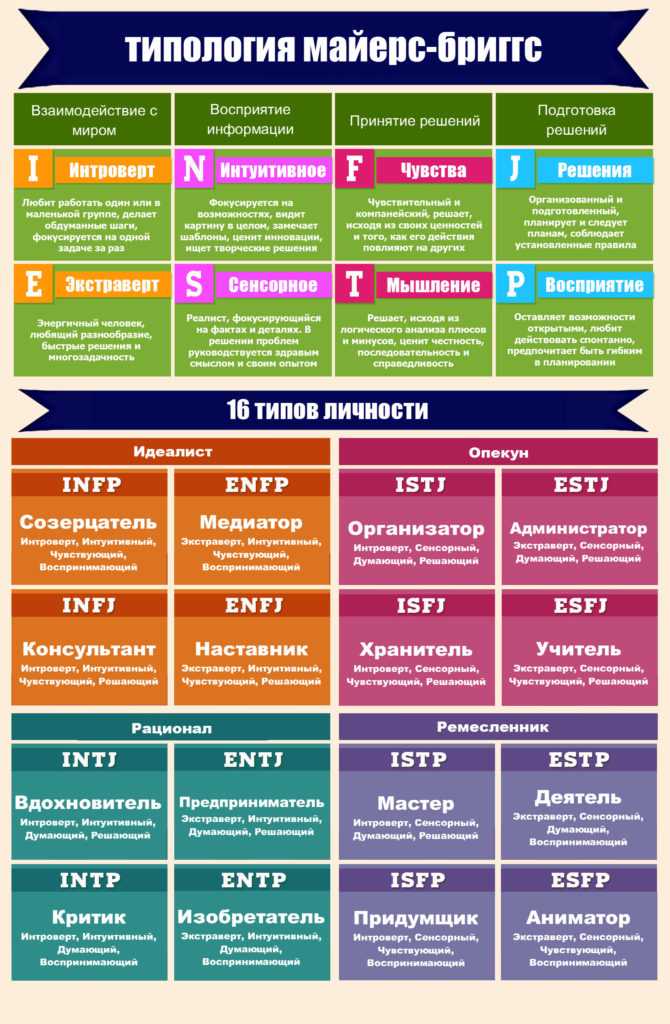 The system automatically provides a description of the primary personality at the beginning of the Overview Report. Variations of the above will be printed if the test taker is a combination of more than one personality type, or a Type X. You can compare the results against the baseline you developed to help speed up your hiring process.
The system automatically provides a description of the primary personality at the beginning of the Overview Report. Variations of the above will be printed if the test taker is a combination of more than one personality type, or a Type X. You can compare the results against the baseline you developed to help speed up your hiring process.
In the Summary Report, a bar chart is provided along with a percentage, or strength, of each of the four personality types. The higher the percentage, the more dominant that personality type. When two or more types of personality are close, or the same, in strength, the applicant may be characteristic of both types.
These Type A, B, C, and D personality descriptions are classic descriptions designed to provide you with some background information about a personality. The Hire Success® system uses these descriptions for contrast to the specific descriptions and values found in the traits section of the report. In many cases, the applicant's individual traits may differ from what you may see described in the overall personality description.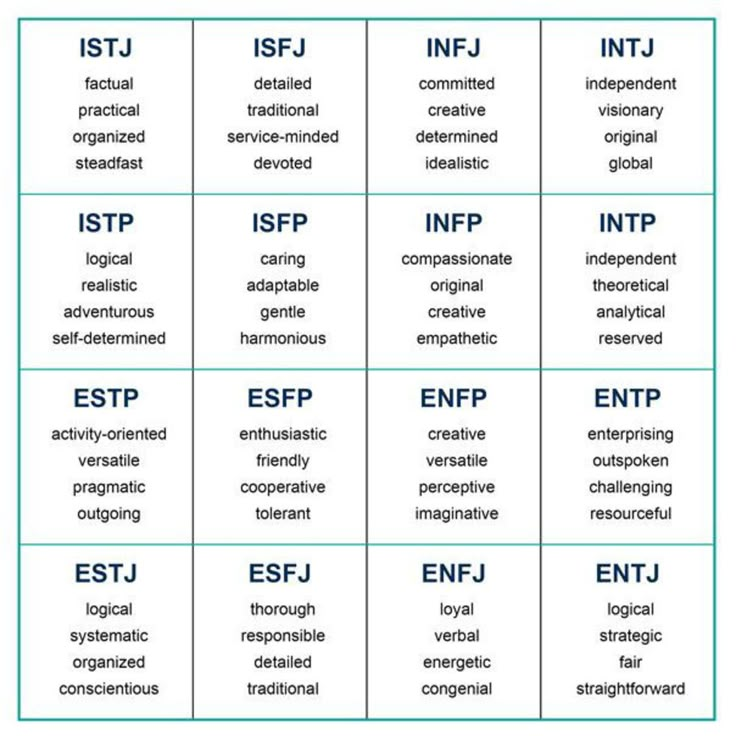
The Hire Success® system determines traits independently and doesn't base trait information on what might be expected from a particular personality type. The inclusion of these expanded traits is one of the ways the Hire Success® system differs from other systems, like Myers-Briggs®, and opens the door to highlight those differences that make the applicant a unique individual — not one squeezed into one of four boxes. If and when you see a trait differ from what might be described in the personality overview, it's not a mistake. It's most likely the trait you can expect to see from the applicant on a day-to-day basis and not just an expectation based on a traditional Type A, B, C, or D personality description.
Back to Top
Try Free Book demo
4 Personality Types that Leaders Should Learn to Recognize
These 4 personality types work and communicate in very different ways. Learning how to identify and understand personality types based on common personality traits is a key component of effective, practical leadership.
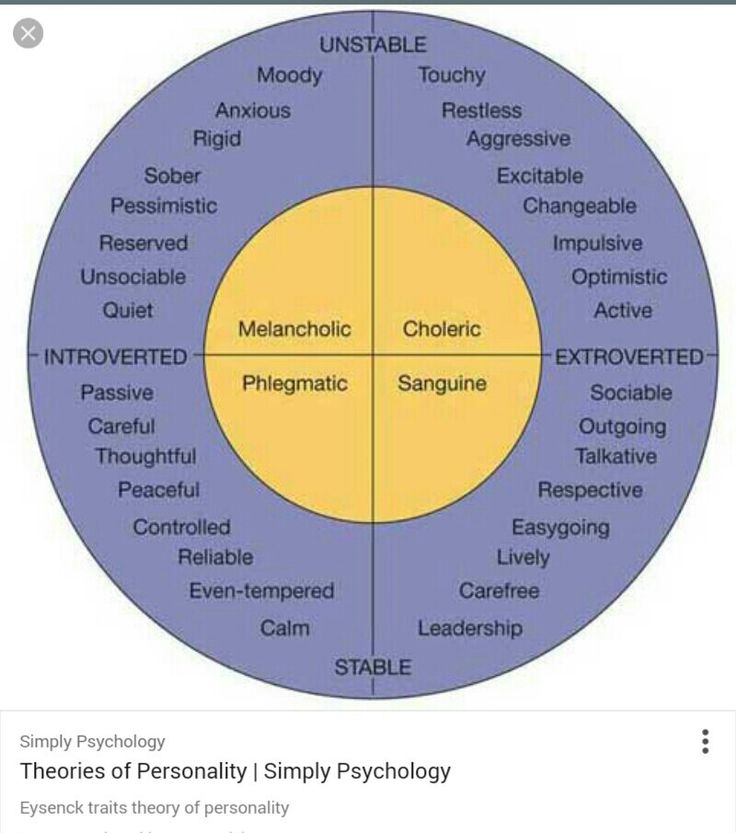
The Golden Rule states: Treat others the way you want to be treated. While this is generally a good rule of thumb, the reality is that, as leaders, we often must break that rule to relate to the various personality types and manage them effectively. Not everyone in the world communicates and reacts to their environment the same way. Some of us enjoy basking in the glow of the limelight, while others are very uncomfortable with public displays of praise situations.
In my experience, there tend to be four main personality types: analytical, driver, amiable, and expressive. Each personality type exhibits general characteristics, strengths, and weaknesses and needs to be managed and communicated with in different ways. Understanding these unique traits will help you successfully manage personality types to increase your team’s job satisfaction, improve performance, and reach organizational goals.
1. AnalyticalThe analytical personality type is very deep and thoughtful.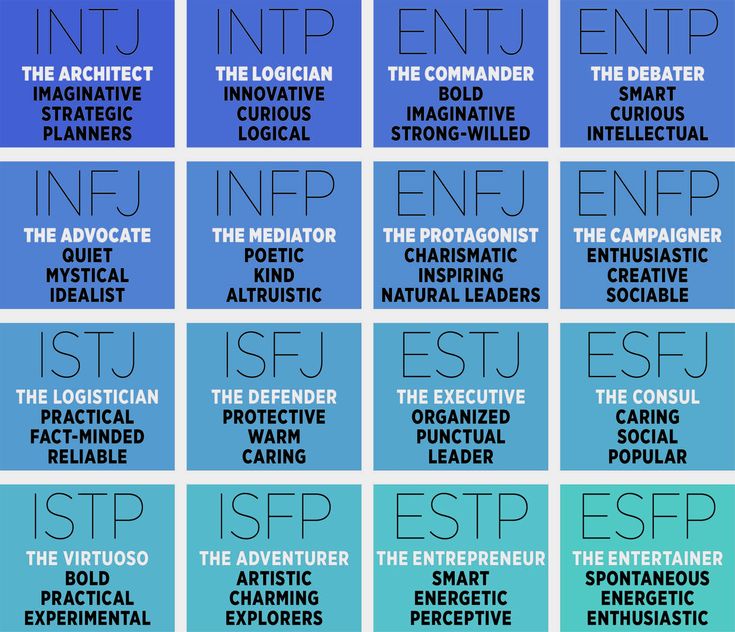 Serious and purposeful individuals, analytical types set very high-performance standards, both personally and professionally. They are orderly and organized and tend to have a dry but witty sense of humor.
Serious and purposeful individuals, analytical types set very high-performance standards, both personally and professionally. They are orderly and organized and tend to have a dry but witty sense of humor.
The strength of analytical personalities lies in their perfectionism, and they want things done right the first time. In addition, analyticals are often economical, tidy and highly self-disciplined.
Analytical people’s weaknesses are that they can be moody, critical, and negative. As the name implies, they often over-analyze everything and have difficulty making decisions. Their perfectionism is also a weakness at times, as they can be guilty of making their pursuit of perfection stall completion.
2. DriverDrivers are dynamic and active personality types. They exude confidence and naturally gravitate toward leadership positions. These personalities are goal-oriented but not detail-oriented. Drivers are great with the big picture—they’re visionaries and can see how we’re going to get to where we need to go.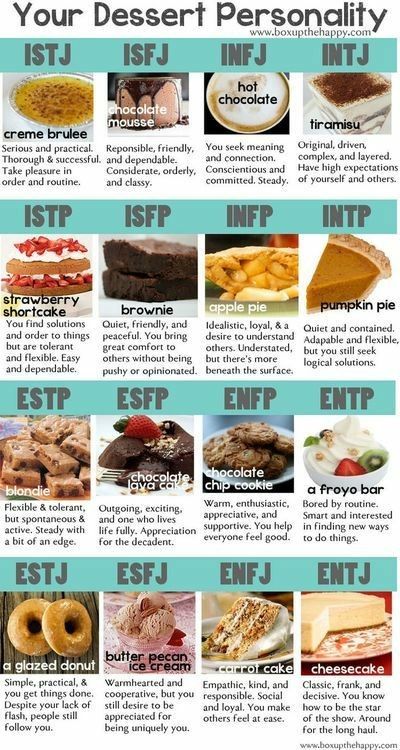 However, drivers are not always great at taking the interim steps necessary to get there.
However, drivers are not always great at taking the interim steps necessary to get there.
You can probably see how an analytical type and a driver might not work very well together – however, their skills can nicely complement each other. As one saying goes, if you want to get to the moon, you hire a driver, but if you want to get back, you hire an analytical.
Drivers’ strongest characteristic is their determination. They are independent, and they are productive. Drivers are decisive visionaries who get things done. A driver would rather make a bad decision than no decision; they just want a decision to be made.
However, the drivers can also be insensitive, unsympathetic, harsh, proud, and sarcastic. Drivers do not like to admit when they are wrong. They can also rush to a decision without thoroughly thinking through or understanding the results or consequences of their decision.
3. AmiableFirst, let’s define amiable personalities. Amiable personality types are known for their friendly and pleasant manner. They are typically a patient and well-balanced individual who is quiet but witty. They’re very sympathetic, kind, and inoffensive—amiables do not like to offend people.
They are typically a patient and well-balanced individual who is quiet but witty. They’re very sympathetic, kind, and inoffensive—amiables do not like to offend people.
An amiable person is easygoing, and consequently, everybody likes them. Do you know why? Because they don’t like conflict, they’re very easy to get along with. They’re diplomatic and calm. Unfortunately, their weakness is that they can be stubborn and selfish. Amiables’ aversion to offense and conflict can make them appear weak or passive.
4. ExpressiveWe call the expressive the social specialist because they love to have fun. They are individuals who turn disaster into humor, prevent dull moments, and are very generous. Expressives want to feel included in everything—projects, teamwork, and conversations.
A great strength of the expressive personality is that they are very outgoing. Likewise, expressive people are ambitious, charismatic, and persuasive. However, they can also be disorganized, undisciplined, loud, and incredibly talkative. Expressives can talk up to 200 words a minute with gusts up to 300. In other words, they can talk!
Expressives can talk up to 200 words a minute with gusts up to 300. In other words, they can talk!
Of course, these are generalizations, and many people will exhibit some amount of any number of these personality types. However, everyone will more strongly exhibit characteristics of one personality type over all the others. Recognizing and understanding which personality types you manage on your team will help you motivate and communicate with them.
Managing different personality types and personality traits is a difficult part of our roles as managers. However, identifying and understanding how each personality type is motivated and how they communicate is a critical step in effectively managing your team to success.
About Crestcom International, LLC.
Crestcom International, LLC is an international leadership development organization, training more than one million leaders for 25,000 businesses in over 60 countries across the globe.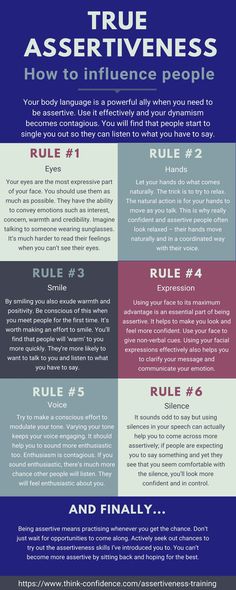 We achieve this through a blend of live-facilitated multimedia videos, interactive exercises, and shared learning experiences. Crestcom implements action plans and coaching accountability sessions to ensure measured development in key leadership competency areas. For more information, please contact your local Crestcom representative found here.
We achieve this through a blend of live-facilitated multimedia videos, interactive exercises, and shared learning experiences. Crestcom implements action plans and coaching accountability sessions to ensure measured development in key leadership competency areas. For more information, please contact your local Crestcom representative found here.
Interested in a free Leadership Skills Workshop with your team?
- Address instantly fixable issues that impact customer perceptions and employee morale.
- Learn and practice a habit that will raise employee performance.
- Set actions with specific and measurable steps that they'll gladly be accountable to achieve.
Book here!
This website uses cookies to improve your experience. We'll assume you're ok with this, but you can opt-out if you wish. Cookie settingsACCEPT
Privacy & Cookies Policy
Notice: JavaScript is required for this content.
Notice: JavaScript is required for this content. No Fields Found.
Notice: JavaScript is required for this content.
Personality types: main differences and their characteristics
Contents of the article
All people are different: someone likes to lead an active lifestyle and communicate a lot, it is easier for someone not to stand out among others, someone is prone to sensitivity and excessive self-criticism. Since ancient times, scientists and philosophers have been interested in the topic of personality classification, many theories have been developed, some of which have become part of modern psychology. In this article, we will briefly analyze the psychological types that the Soviet scientist A.E. Lichko developed while observing adolescents. It is in adolescence that individual character traits and psychological characteristics are quite strongly manifested, which are smoothed out during growing up, but can manifest themselves at a moment of crisis.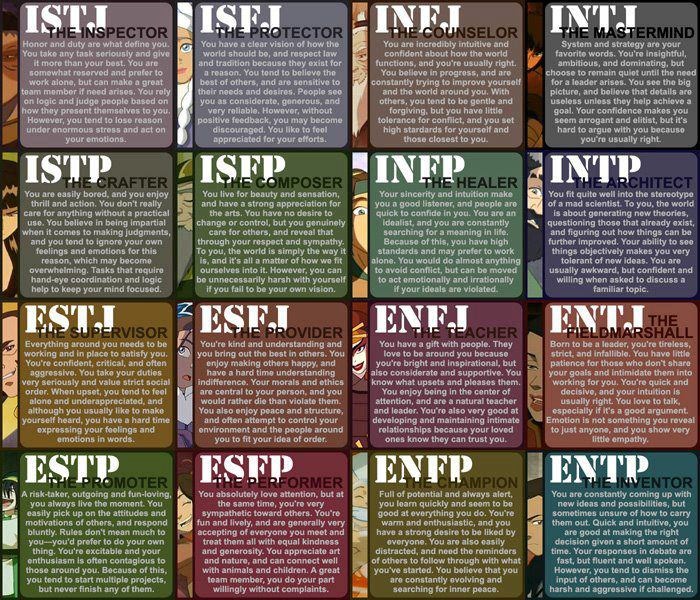 Even more types of personality classifications can be found in the free online course "Typology of Personality" on the platform "Russia - a country of opportunities".
Even more types of personality classifications can be found in the free online course "Typology of Personality" on the platform "Russia - a country of opportunities".
Asthenoneurotic type
People with a weak nervous system who are characterized by low stamina, irritability and overwork. They get tired more from psychological stress than from physical exertion. When working for a long time, they need frequent breaks, in general they like to work at their own pace. Such people are hard to switch from one activity to another, it is better not to distract them from the process once again. Any unforeseen situations cause them irritability and anxiety. But these people are very careful and disciplined, they can spend hours doing monotonous work that does not require speed.
Unstable type
Complex personality type, which is characterized by irresponsibility, idleness and addiction, for example, from alcohol, drugs, games. Such people strive for pleasure, they want to constantly relax and have fun.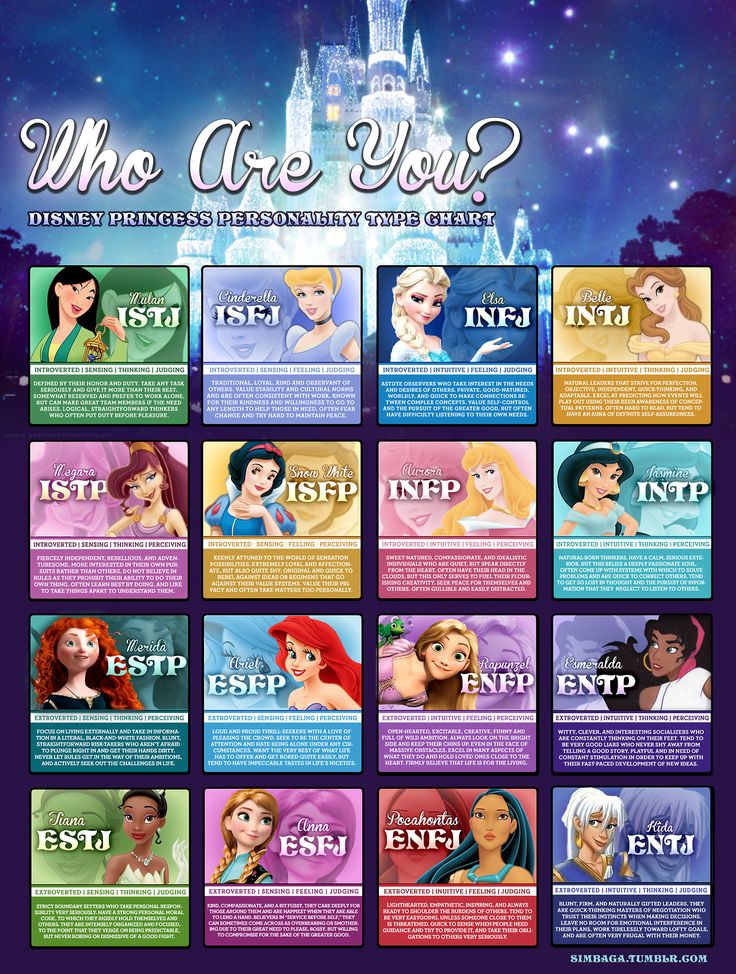 They often have problems with work, they do not want to study and grow professionally. This type of personality can be called a real hedonist who sees entertainment and enjoyment as the main goal of his life. The positive features include openness and sociability.
They often have problems with work, they do not want to study and grow professionally. This type of personality can be called a real hedonist who sees entertainment and enjoyment as the main goal of his life. The positive features include openness and sociability.
Conformal type
People who strive to live like everyone else and do not want to stand out from the crowd once again. The opinion of others is very important to them, they try to earn the praise and approval of others. Basically, the way of life of such people directly depends on the society in which they live. If there are religious people around them, then the conformist will be a believer to the point of fanaticism. It is also difficult for them to change something in their lives, it is difficult to pull them out of their comfort zone. Positive features include low conflict, friendliness, devotion and diligence.
Labile type
Empathic people who can feel the mood and feelings of others well.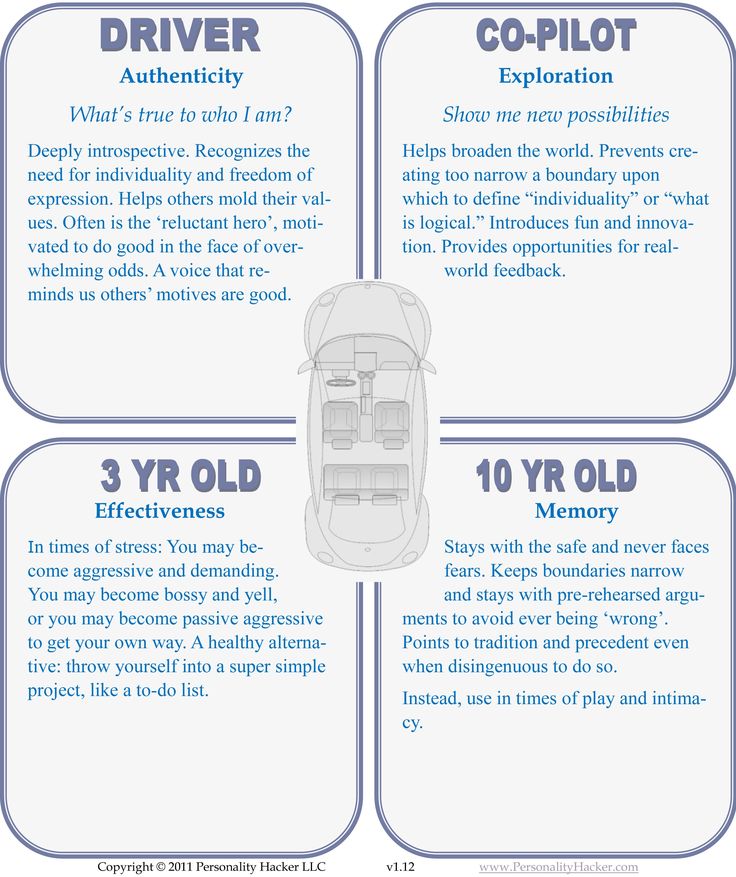 They often make outstanding psychologists and social workers. They are open and always ready to help and support with a kind word. But this type is very sensitive and touchy, does not tolerate criticism in his address, cannot stand loneliness and changes in life.
They often make outstanding psychologists and social workers. They are open and always ready to help and support with a kind word. But this type is very sensitive and touchy, does not tolerate criticism in his address, cannot stand loneliness and changes in life.
Cycloid type
People who are prone to sudden mood swings experience strong emotions - either they are overly happy, or they feel sad on the verge of depression. They cope with internal experiences for a long time, they are distinguished by excitability and irritability, sometimes aggressiveness. The positive traits include sociability and friendliness.
Sensitive
People with excessive impressionability, vulnerability and openness. They can get excited about simple things that most people don't notice. They also keep pleasant and unpleasant memories for many years, which flash in memory as if in reality. This type of personality is difficult to tolerate public criticism, is very afraid of being ridiculed.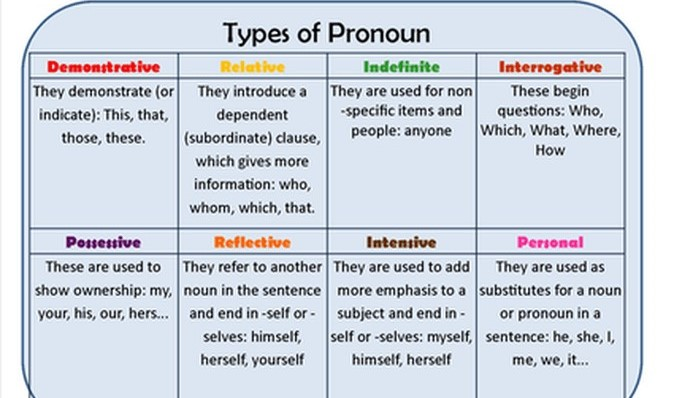 Positive traits include increased morality, compassion and sociability.
Positive traits include increased morality, compassion and sociability.
Psychasthenic type
People who are prone to introspection and reflection like to delve into themselves and criticize for shortcomings. They have an excellent memory, so they remember their mistakes well and often engage in self-flagellation. Hence, they have a lack of confidence in their abilities, they take too long to make decisions, doubt and are afraid to stumble again. The positive features include loyalty and reliability, they will never betray loved ones and will always stand up for their own.
Schizoid type
Closed and unsociable people who do not know how or do not want to build close relationships with others. But they do a great job of maintaining business relationships. They have a rich inner world, into which they prefer not to let anyone in. Many people have high intelligence and out-of-the-box thinking. But they practically do not know how to recognize other people's emotions.
Epileptoid type
The most complex type of people, prone to breakdowns, aggression and pedantry. They seek to subjugate everyone, to win an authoritarian position. Such people do not know how to build friendly relations at all, they can vent evil on others, they are very scrupulous about the work of employees. But personalities of this type can be strong leaders.
Hysterical type
Personality type requiring increased attention to oneself. They need constant admiration and reverence. Indifference to their person is the worst scenario for them. Such people are prone to fantasy and lies in order to create a vivid image for themselves. However, they make excellent actors and presenters.
Hyperthymic type
Active and cheerful people who are almost always in high spirits. They are sociable, a little frivolous, generally do not tolerate monotony and monotony, often prone to unjustified risk.
What are the types of personality and how to interact with them
It is a matter of life experience to understand what kind of person you are in front of you.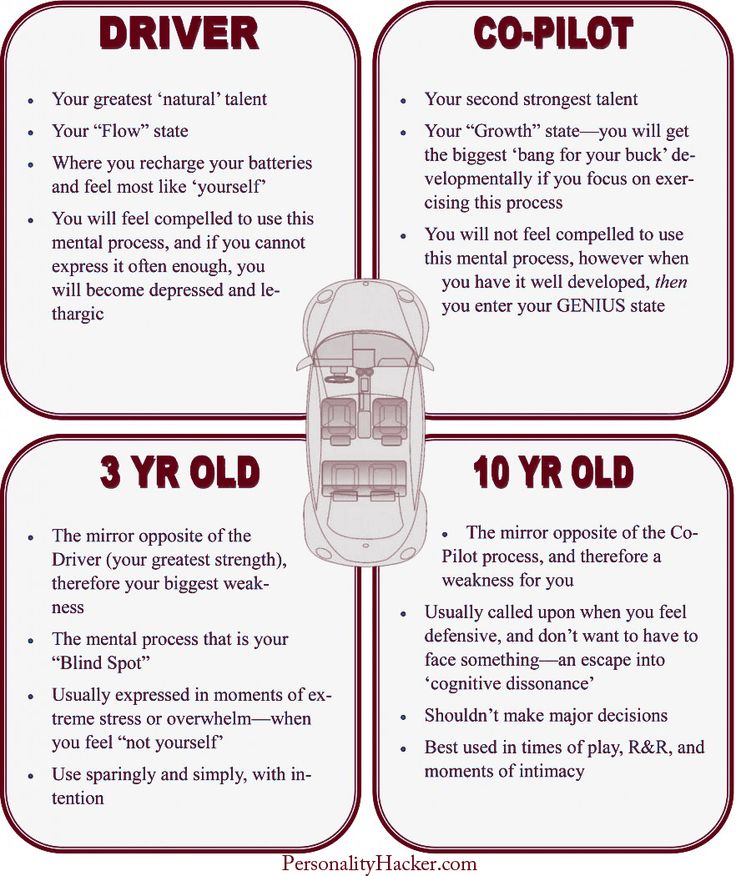 But learning from our mistakes, as we know, is not always useful, which is why we often resort to psychology. You can understand the characteristics of your interlocutor right now and build relationships with him correctly, guided by simple knowledge about 10 basic personality types. Get ready - below is a very practical and useful guide from Tatyana Vladimirovna Mizinova, Ph.D., President of the European Association for the Development of Psychoanalysis and Psychotherapy (EARPP), Vice President of ECPP (Vienna, Austria) and Director of the Persona psychological center.
But learning from our mistakes, as we know, is not always useful, which is why we often resort to psychology. You can understand the characteristics of your interlocutor right now and build relationships with him correctly, guided by simple knowledge about 10 basic personality types. Get ready - below is a very practical and useful guide from Tatyana Vladimirovna Mizinova, Ph.D., President of the European Association for the Development of Psychoanalysis and Psychotherapy (EARPP), Vice President of ECPP (Vienna, Austria) and Director of the Persona psychological center.
For centuries people have sought to create classifications that could predict or explain the behavior of others.
Astrology offered signs of the zodiac, the Chinese horoscope determined the features of a person depending on the year of birth. As science developed, more precise and specific personality typologies appeared. One of the first belongs to Hippocrates, who singled out four types of temperament and, on the basis of the views that existed in science at that time, associated them with the influence of the internal fluids of the body:
Phlegmatic is a calm and unflappable person who rarely shows his true emotions and feelings. In study and work, he will be thorough and unhurried, paying attention to detail and quality.
In study and work, he will be thorough and unhurried, paying attention to detail and quality.
Choleric is an impulsive, impetuous and passionate person with a sharply changing mood. He also quickly loses interest in the things he has started, especially if they do not bring immediate results. Showing exorbitant activity, choleric people are quickly exhausted emotionally and physically.
Sanguine is an active person with a quick reaction to events taking place around him, but at the same time able to maintain interest in work, even if it is not very interesting. Can easily experience failure.
Melancholic - an impressionable person, often in despondency and thoughts, easily vulnerable, prone to constant experience of his internal processes. Prefers to avoid noisy communication and work alone.
With the development of scientific knowledge and the growing interest in human psychology, dozens of other classifications have appeared based on completely different criteria, and sometimes repeating and complementing each other.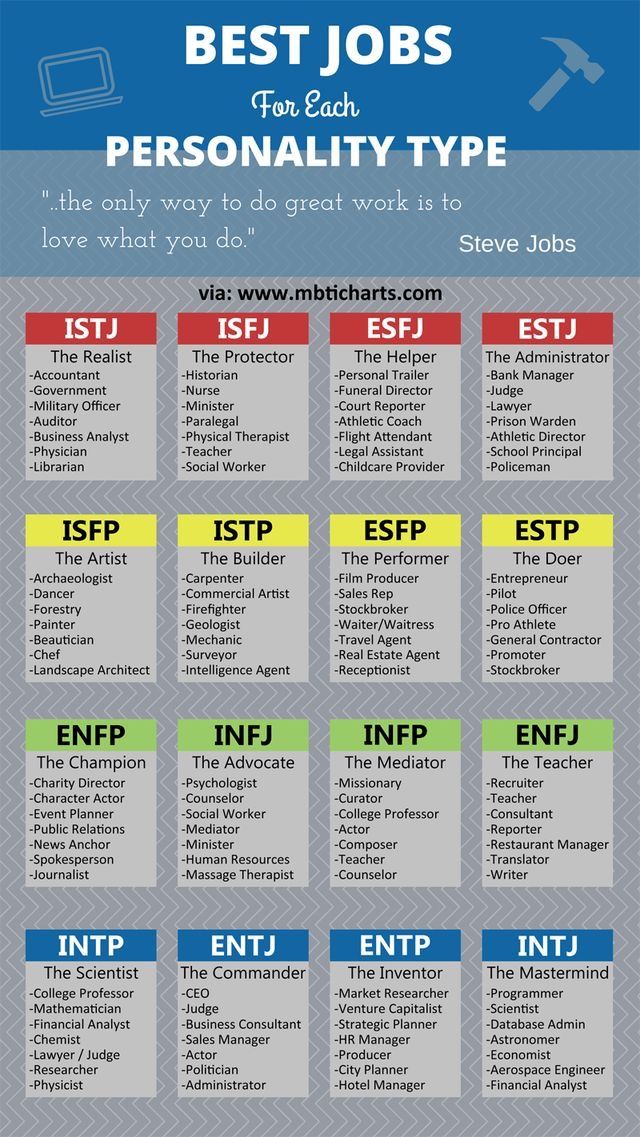
Thus, Jung singled out two main psychotypes of personality based on the reaction to external stimuli. An extrovert is a person who enjoys communicating with others, open to the world and willing to make contact. Introvert - is distinguished by restraint and prefers solitude to social contacts.
German psychiatrist Ernst Kretschmer and American psychologist William Sheldon proposed a theory about the relationship of temperament type with bodily manifestations and described three types of physique and their corresponding psychological types.
Asthenik - a man with narrow bones, underdeveloped muscles, thin. He tries not to take active actions and prefers reflection. Often these are closed people who avoid active communication.
Athletic - the owner of a developed skeleton and muscles. Purposeful, persistent, energetic, prone to risk. This type of people is prone to impulsive actions without much thought.
Picnic — overweight, good-natured, open person, prone to seeking comfort and enjoying food.
Very common and often used today is the classification according to the leading type of perception in humans.
Visual psychotype . It is important for such people to see. Best of all, they assimilate information when reading, and also always evaluate externally, since images, colors, visualization, and gestures play an important role for them.
Auditory psychotype. Such people pay attention to the interlocutor's speech, voice timbre, tone. The information that they perceive by ear is more understandable for them and is better remembered.
Kinesthetic Psychotype . People of this psychotype are used to feeling. Tactile contacts are important to them, they perceive information through smell, touch and with the help of movements.
Discrete - a person whose perception of information occurs through logical comprehension with the help of numbers, signs, arguments.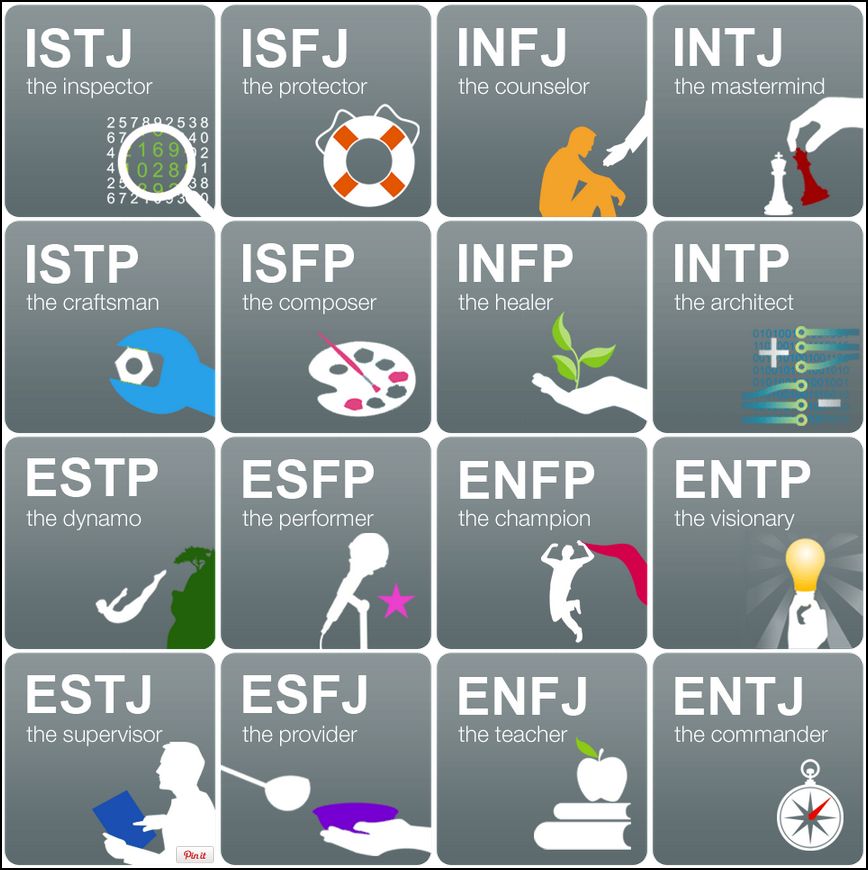 This psychotype develops as a person grows up, since it is based on well-formed logical thinking.
This psychotype develops as a person grows up, since it is based on well-formed logical thinking.
These are just a few of the most well-known classifications, which make it possible to conditionally group people into groups according to related characteristics.
A more interesting and deeper classification, on the basis of which psychoanalysts and psychoanalytic psychotherapists work, is the classification proposed by Nancy McWilliams in the book "Psychoanalytic Diagnosis". It describes ten basic personality types.
Schizoid personality type
How to recognize? Most often this type of personality occurs in men. They appear self-absorbed and often avoid contact, preferring computer games instead. Outwardly, they look like loners with “frozen” feelings and strangers in the company detached from the whole world. However, this erroneous impression disappears if you get to know them better. These are very subtly and sharply feeling people, capable of love and care, but they cannot stand the noise and pressure on them.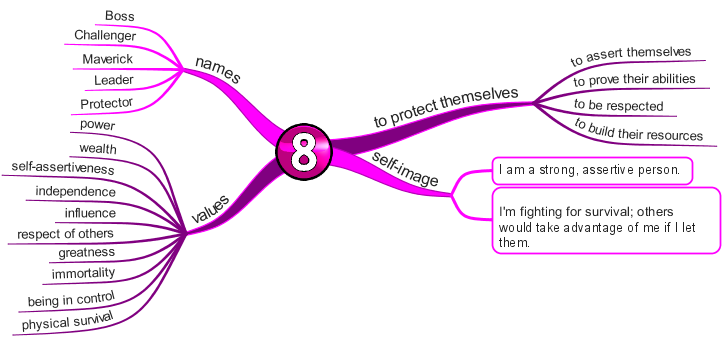
How to interact? They live at their own pace and are grateful if their partners understand them and don't put too much pressure on them. Meetings and joint affairs with them must be agreed in advance, since spontaneous actions frighten them rather than attract them. In any IT company, you can always find many employees with this type of personality.
Antisocial personality type
How to recognize? Most often these are people whose childhood was spent in difficult conditions. Not receiving enough love and care, they perceive the world as a threat and react with aggression, even when no one attacks them. People with an antisocial personality type are not capable of empathy and cannot understand the feelings of others, so they rarely establish strong relationships and often change partners without trusting anyone. When they meet, they give the impression of bright, courageous people and attract with their extraordinary and sometimes risky actions.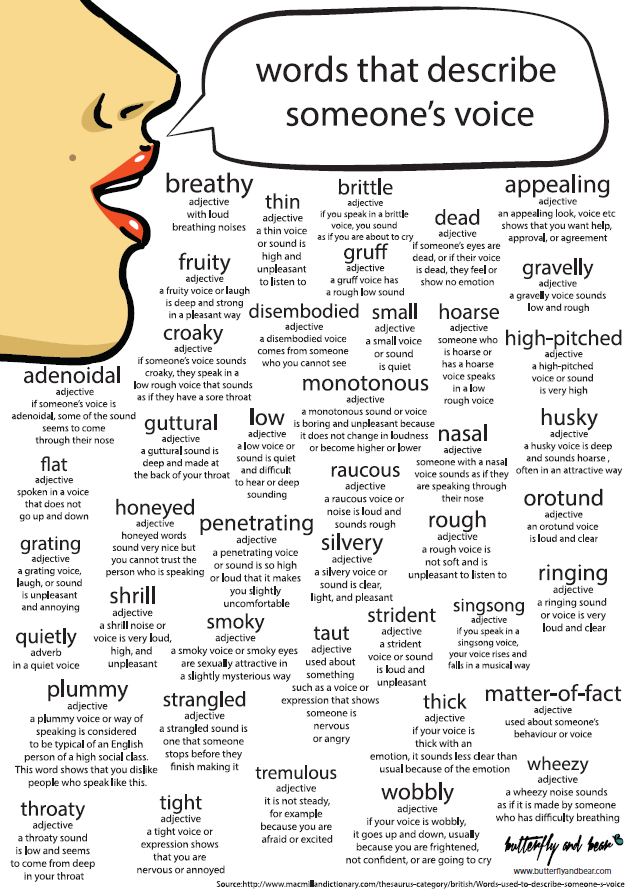
How to interact? They generously make promises that will never come true, involve them in failed projects for their own benefit, and never feel remorse for hurting loved ones. Oddly enough, antisocial individuals, going over their heads, are successful in business - their unscrupulousness helps them in this. What you never hear from people of this type are words of tenderness. Any manifestation of feelings they perceive as weakness.
Depressive personality type
How to recognize? These are people whose attitude is based on low self-esteem and the feeling that they will always be not good enough. In childhood, they were rejected by their parents: for example, they were left to live with their grandmother. This experience in adulthood is transformed into their unconscious belief that they are worthy of rejection. The whole life of people with a depressive personality type is aimed at earning the love and recognition of others.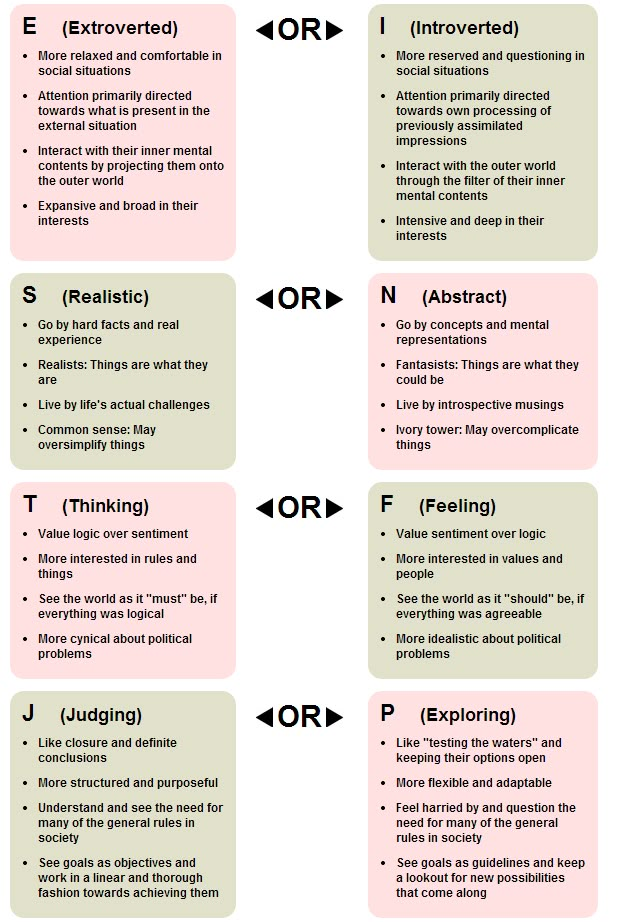
How to interact? These are very kind, gentle people, often sacrificing themselves without any benefit. They try to do as much good as possible in all areas that are available to them. They rarely get angry and express dissatisfaction with others, directing negative feelings towards themselves. People of the depressive type are prone to anhedonia and respond with great gratitude to any manifestations of attention and love for them.
Manic personality type
How to recognize? A person with a manic personality type is always cheerful and cheerful, tends to idealize others, often flirts and attracts attention with noisy behavior, which is sometimes excessive.
In almost any company there is a person who speaks loudly, gesticulates actively, gushing with jokes and ideas, thus greatly tiring others. It is quite difficult and tiring to be with such a person for a long time - this is the basis of his problems.
How to interact? Manic people cannot stand loneliness, immediately falling into anxiety, but their activity gives the impression of superficial communication and unwillingness to enter into close relationships.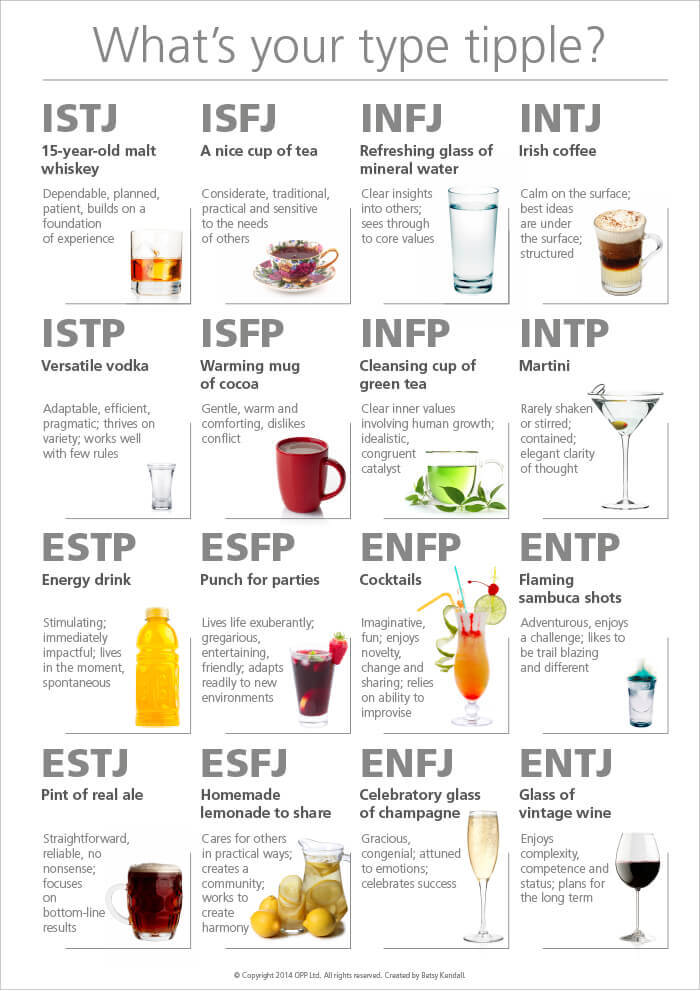 People with this type of character can be excellent organizers and crisis managers. They are successful in any business that requires quick turn-on and action.
People with this type of character can be excellent organizers and crisis managers. They are successful in any business that requires quick turn-on and action.
Narcissistic personality type
How to recognize? This personality type has often been demonized lately, and the words "narcissist" and "abuser" have become almost synonymous. But it is not so. Most often, people of this type grow up in families where love had to be earned, they were constantly compared with other children, emphasizing other people's achievements and devaluing his own. The feeling that he was good and loved arose only if he was praised for grades or other merits. People with a narcissistic personality type are in two polar states: grandiosity and insignificance. They need to constantly achieve the highest results in order to feel good. The slightest failure is perceived as a total failure, which is accompanied by a sense of destructive shame.
How to interact? They cannot stand the slightest criticism, they are constantly preoccupied with their appearance and social status, they suffer from perfectionism, which does not make them feel the joy of achievements.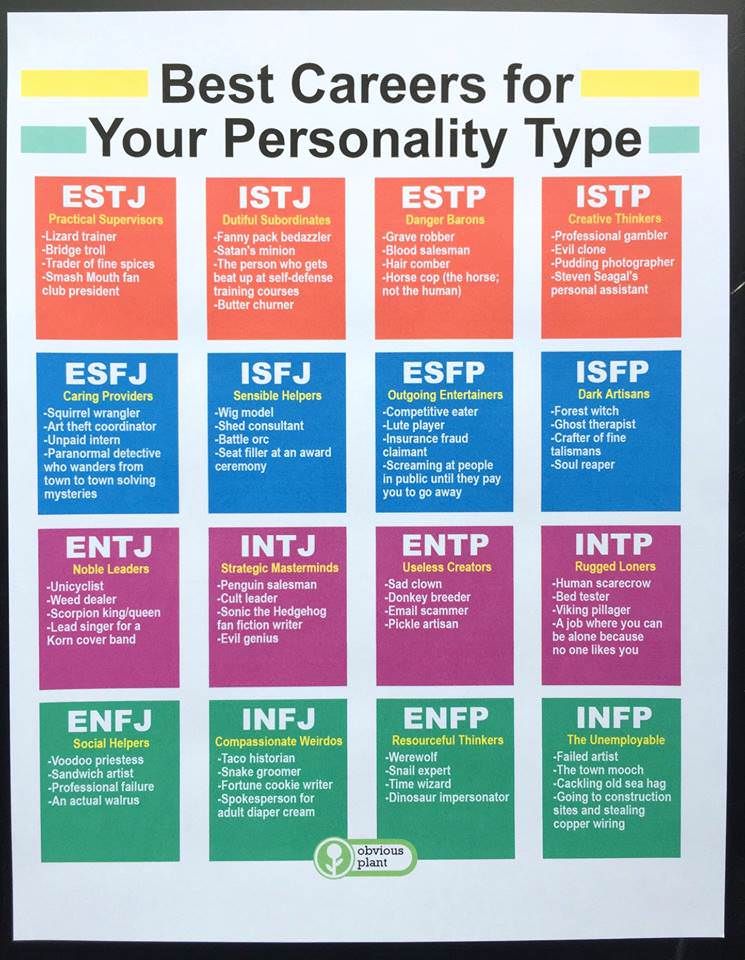 This psychotype is equally found among both men and women. At the beginning of a relationship, a bright and unforgettable period of passion and adventure awaits them, which is always replaced by disappointment and the problem of getting out of this relationship, as the partners are held by memories and the hope of returning all the good things.
This psychotype is equally found among both men and women. At the beginning of a relationship, a bright and unforgettable period of passion and adventure awaits them, which is always replaced by disappointment and the problem of getting out of this relationship, as the partners are held by memories and the hope of returning all the good things.
Paranoid personality type
How to recognize? One could say about the paranoid personality type that these are people with a “bad character”. Suspicion, incredulity, lack of a sense of humor, criticality are their characteristic features, which often lead to a lack of friends and family relationships.
How to interact? Often they are consumed by pathological jealousy - they can constantly check their partner, because they are afraid of betrayal and see him everywhere. The feeling of constant tension and the inability to relax, the need to be in constant struggle, greatly complicate their life.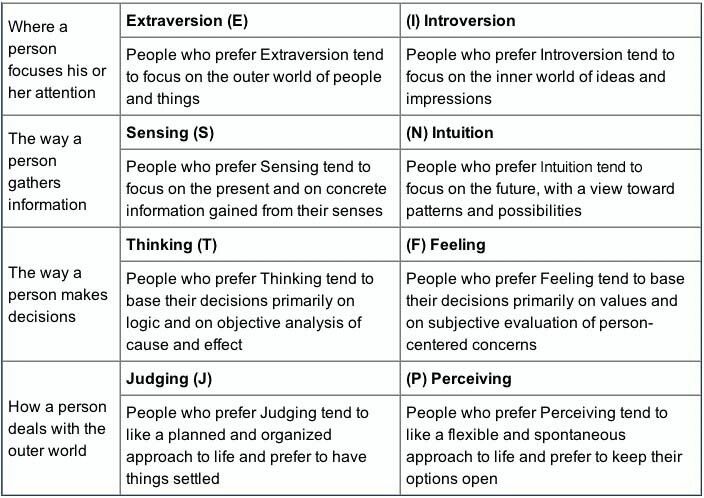 At the same time, these are people with a high level of intelligence: they can reach high positions in areas where their character traits are applicable.
At the same time, these are people with a high level of intelligence: they can reach high positions in areas where their character traits are applicable.
Masochistic personality type
How to recognize? Often these are people who are defiantly in the position of a victim, forcing others to show sympathy and support for them. There are three main topics that these people complain about:
- Health - it is paradoxical that, constantly complaining about their health, they rarely take it seriously and go to the doctors. Even if they seek the help of a specialist, they still do not follow the recommendations.
- Marriage - often choosing partners who are abusers and alcoholics, they do not at all want to part with them, but are inspired by the idea of saving or re-educating them.
- Children — life sacrificed for the sake of children becomes the central idea, even if the children do not need it and the extra care rather burdens them.
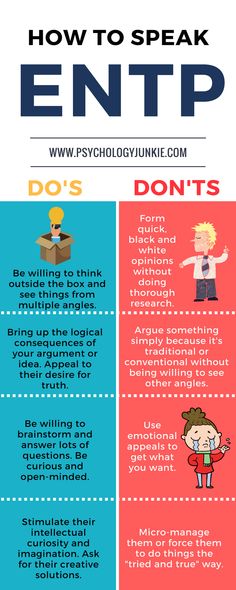
How to interact? Most often, women belong to this type of personality. Before we allow ourselves to be drawn into a discussion of their suffering, we need to consider whether we are becoming an object of manipulation.
Obsessive-compulsive personality type
How to recognize? The obsessive personality type tends to get stuck on thinking about ideas and intentions, for them the transition to action is problematic.
Any purchase, not to mention changing jobs or choosing an apartment, causes a lot of problems and doubts. They can plan trips for years, but not take concrete steps, as they are not sure of the correctness of their choice.
In contrast, people of the compulsive type are prone to rash impulsive actions and decisions that they later regret.
How to interact? Parents of people with this personality type are overly strict and demand absolute obedience from their children.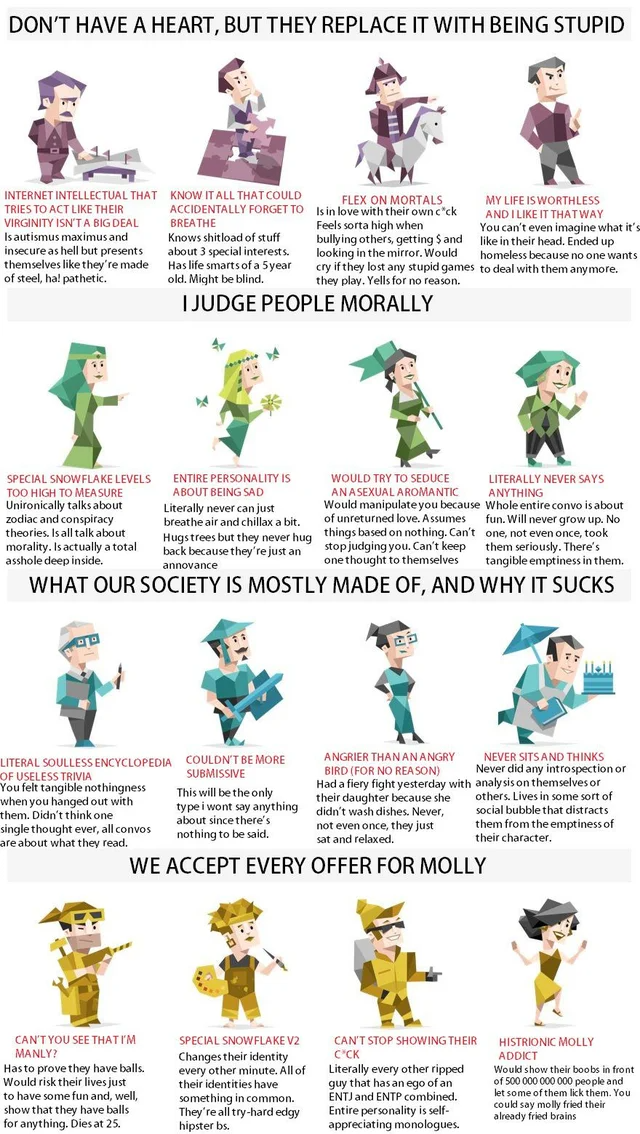 As a result, they either accept these settings, constantly doubting the correctness of the choice, or they rebel, trying to do everything quickly, until the conditional "parent" stops them. People of this type are kind, take responsibility, are attuned to family life and love to equip life.
As a result, they either accept these settings, constantly doubting the correctness of the choice, or they rebel, trying to do everything quickly, until the conditional "parent" stops them. People of this type are kind, take responsibility, are attuned to family life and love to equip life.
Hysterical personality type (theatrical personality)
How to recognize? Bright, demonstrative, in need of attention and demanding love. Most often, it is women who are representatives of the hysterical type of personality.
They tend to get into stories connected with love dramas, they can drag them out for years, falling into dependence on these experiences. Therefore, they often move from one love crisis to another.
How to interact? The hysterical personality type implies high emotionality, but at the same time the ability to create strong, warm and stable relationships. In them, the partner will be comfortable, provided that he is generous with compliments and manifestations of love.